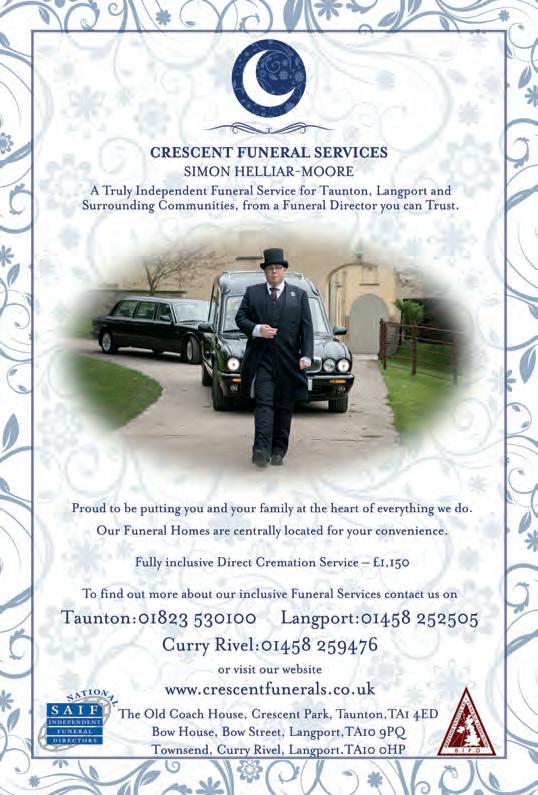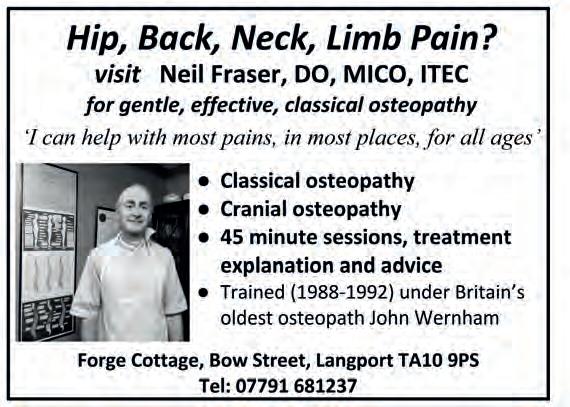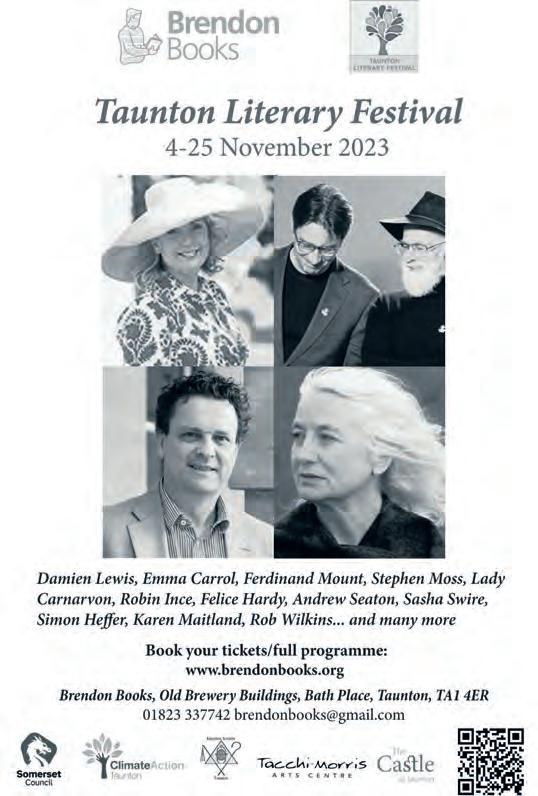




FREE


2
Somerset Confidential®
If you enjoy reading The Leveller® why not give our sister publication, Somerset Confidential® a go? Featuring many of the same writers as The Leveller® Somerset Confidential® is an online news service. Delivered direct to your email inbox every week. It is delivered via the “Substack” platform. Somerset Confidential is not funded by advertising. All the work is carried out by independent journalists funded entirely by subscriptions. You can take a free subscription to get access to a lot of the material.
A paid subscription costs just £30 (that’s equivalent to 58p a week) and gives you:
2 extra longform pieces each month
Access to the full back catalogue of articles
The opportunity to comment on articles
To sign up for Somerset Confidential just Google “Somerset Confidential substack” and follow the link then click on “support Somerset Confidential.
It’s easy really.
Letters to the editor
Dear Editor
As a retired GP, I wish to make an important point to avoid confusion in your otherwise informative article about GP consultations.
In your article in your September edition you highlight the issues of five minute appointments and the reduced number of “fully qualified” GPs. May I point out that no doctor can practice as a GP without being fully qualified. A major problem in general practice that has worsened over the past 15 years is not the overall number of GPs in Somerset but the fact that an increasing number of GPs now choose to work part-time. The number of so called “whole time equivalent” GPs is much lower than the “fully qualified” figure you quote. You refer also to the national situation for GP appointments and correctly comment that the overall number of GPs is falling. You do not also point out that, at the same time, the population of England is both increasing in number and an ageing population always places a greater strain on any health service.
David Lindsay Retired Somerset GP
Dear Editor
The Demise of the Traditions of Democracy
I have read the letters in last month’s Leveller and they all seem to have a basic common denominator in that they deplore the way the community is manipulated by the authorities and their representatives. In political terms, the government of the people by the people is not operating, and in the wider fields pressure groups and misleading and selective information is the rule of the day.
All the major political parties are focused on a centrally controlled totalitarian system which appears to think they can micro manage everything and everybody, from Caithness to Cornwall. At the same time their policies appear to be supported and advised on by the metropolitan elite. A less representative sample of the British people and their way of life it is difficult to imagine. The substitution of “First Past The Post”, by “Proportional Representation” increases the central control of the approved candidate list, and reduces local control of representation. To this must be added a much more open system to call to account elected members.
Your article “Rule from Bridgwater” would seem to confirm, that even at what is now referred to as Local Government, the ease of management is more important than democracy and representation of the people. In a rural area, with little public transport, and the reduced ability of the actual public to put forward their factual local information, added to the contract planner working from home democracy appears remote.
Colin Winder Wincanton
Editors’ Code
The Leveller® adheres to the standards set out in Editors’ Code. We operate a complaints procedure. If you wish to complain, please write to, or email the editor in the first instance (contact details as below).
Where to get your copy
The Leveller® is distributed on the 15th of the month via a network of local shops and pubs (see our website); we are very grateful for their support.
Our values
● Fair in our coverage
● Independent in our views
● Locally produced
● Promoting local enterprise
● Sensitive to the environment
● Careful with your data
Our Team
Editor: Andrew Lee: levellereditor@gmail.com
Staff Writers : Ancient Pistol: ancienpistolet@gmail.com
Writer at large: James Garrett
Sub Editor: Kate Roberts
Ad Manager: Ruth White levelleradvert@gmail.com
Ad Sales Executive: Juliet Barber levellermarketing@gmail.com
Art & Design: Rob Hutchinson
Advisory Board : Anthony Gibson, Paul Bell
Write to us at Leveller Publishing Group, Great Western House, Westover, Langport TA10 9RB
Advertise with us
We have a simple rate card offering ad sizes from an eighth of a page upwards. To request a rate card contact Ruth: levelleradvert@gmail.com or on 07973 758728
Juliet: levellermarketing@gmail.com 07544 737860
LevellerLive
For all our social media and online work we use the LevellerLive brand. You can find us on @LevellerLive on Twitter, Facebook, Instagram and YouTube.
For news between issues, go to our website: leveller.live
Copyright and
3
ownership
material, written and pictorial is © Leveller® Publishing Group unless otherwise stated and may not be reproduced, stored in a retrieval system or transmitted in any form, without prior express permission in writing. The Leveller® is an independent free newspaper published & distributed each month by the Leveller® Publishing Group. It
owned by Even Handed Licensing Ltd of Great Western House, Westover, Langport, TA10 9RB. Regular columnists Alison Hayward, David Young, Guy Smith, Helen & Graham Walker, Jane Earthy, Jane Rodger, Lindsay Wright, Paul Adamson, Stephanie Harris Plender. Other contributors as credited. In-House Photos Andrew Lee, “Unsplash” or as per photo credit. Index to this edition Notices, letters and jobs Letters 3-4 Public Notices & Information 6 Jobs 36 Comment pieces Editorial 8 Political commentators 10-13 News Local News 14-24 Somerset News 1, 26-35 Business 37-38 Lifestyle My Somerset Home 39-52 Motoring 53-54 Culture/events 55-64
All
is
Next issue dates: Copy deadline 28 October Publication date 15 November

Dear Editor,
The September 2023 Edition of The Leveller contained a short piece by James Chapman, Lead Officer for Somerset Tree Strategy. In that article he mentioned the work of Reimagining the Levels (RtL) and I would like to take the opportunity to tell your readers more about our work and the ways they can get involved.
RtL is a Community Benefit Society formed in 2015 after the shocking floods of the Levels and Moors. Our rationale is to find long-term sustainable and environmentally sensitive solutions to the serious impact that Climate Change and pollution is having on this fragile landscape. We have increasingly focused on woodland and hedgerow replenishment as the most effective way of dealing with both. We have partnered with Somerset Rivers Authority, the Farming and Wildlife Advisory Group SW, Woodland Trust and the Green Scythe Fair who provide us with funds, detailed water flow maps and trees so that we can ensure we support planting the right trees in the right place.
Mr Chapman identified the low woodland coverage Somerset has as a county and to date RtL have enabled over 85,000 mostly native trees and shrubs to be added to the Somerset landscape along with approximately 4 miles of hedgerows. The latter is particularly important as 50% of UK hedgerows have been lost since WWII and 60% of those remaining are badly managed. Hedgerow roots run deep, allowing a larger, deeper area of the soil profile to act like a sponge, thus absorbing more water. They also provide food and shelter for wildlife where none would exist otherwise.
As the 2023/24 tree planting season approaches, we are keen to hear from community groups and individuals with land to plant. Parish Councils may have pockets of land that could be enhanced; schools might need a hedgerow or copse planted or renovated. If you are a landowner with a plot of land, you might have a corner or a larger area which you have been thinking of planting. We would love to hear from you all and can discuss how we can make it happen.
RtL give advice on what to plant and where in order to ensure that no ecologically important or sensitive space is harmed but a new


generation of woodland and copses is created. We also offer instruction on how best to plant in order to maximise the health and longevity of trees or shrubs and how to look after them in their first few years. There are some grants for stock proof fencing as well. We are helped by a vibrant and growing band of volunteers at our Tree Nursery and plantings. Please do think about joining us. You can contact RtL via our website www.reimaginingthelevels.org.uk or email Katetowers.rtl@gmail.com or phone 07872 664543. We look forward to hearing from you
Carrie Skinner (RtL) Moorlinch
Dear Andrew
Are any of your readers members of the Pension Protection Fund or the Financial Assistance Scheme? If so, they may be struggling to get by on their pension payments which give no indexation in respect of years of service prior to 1997. The effect of this is that the older you are, the worse your terms of payment. That’s age discrimination.
Not-for-profit Deprived Pensioners Association has been formed to fight against this wrong and is currently raising money to bring a case of Judicial Review. This is being done through the CrowdJustice website under the banner #oldiesfightback. I urge any of your readers so affected to go to the DPA website: deprivedpensioners.org. to read the page “Calling all PPF/FAS members”, and to make a donation.
Many of the people affected are quite elderly and possibly not very lively on the social media. This is why it is so important to reach them through your columns and I thank you for this opportunity to do so.
Regards
Roger Hand Stoke St Gregory
4 Letters to the editor

5 Advertisements
Your Council Contacts
You should be able to get details of services and meeting dates via the contact details for your local council below:
Town Councils
Axbridge Town Council 07884 264033 https://axbridge-tc.gov.uk/
Bridgwater Town Council 01278 427692
Bruton Town Council 01749 813014 townclerk@brutontowncouncil.gov.uk
Burnham on Sea & Highbridge Town Council 01278 788088 townclerk@burnham-highbridge-tc.gov.uk
Castle Cary Town Council (01963) 359631 town.clerk@castle-cary.co.uk
Chard Town Council 01460 239567
Crewkerne Town Council 01460 74001
Dulverton Town Council 01398 324561 clerk@dulvertontowncouncil.co.uk
Frome Town Council 01373 465757 info@frometowncouncil.gov.uk
Glastonbury Town Council 01458 831769 office@glastonbury.gov.uk
Ilminster Town Council 01460 52149 town.council@ilminster.gov.uk
Langport Town Council 01458 259700 office@langport.life
Martock Town Council 01935 822891 or 07506 286382 clerk@martock-pc.gov.uk
Minehead Town Council 01643 707213 info@mineheadtowncouncil.co.uk
North Petherton Town Council 01823 574074 https://northpethertontowncouncil.gov.uk/
Shepton Mallet Town Council 01749 343984 info@sheptonmallet-tc.gov.uk
Somerton Town Council 01458 272236 town.clerk@somertontowncouncil.gov.uk
Street Parish Council 01458 440588 street.parish@street-pc.gov.uk


Taunton Town Council 01823 793637 Info@taunton-tc.gov.uk
Watchet Town Council 01984 633344 townclerk@watchettowncouncil.org
Wellington Town Council 01823 662855 info@wellingtontowncouncil.co.uk
Wells City Council 01749 673091 townclerk@wells.gov.uk
Wincanton Town Council 01963 31693 info@wincantontowncouncil.co.uk
Wiveliscombe Town Council 01984 631914 or TownClerk@wiveliscombe.com
Yeovil Town Council 01935 382424 ytc@yeovil.gov.uk
Somerset Council Office hours (8.30-5.00) service: 0300 123 2224
There’s no email contact for the council. However there is a web page which allows you to report specific items to obtain information or make payment. Go to: https://www.somerset.gov.uk/contact-us/

Public Notices and information


7 Advertisements
“Who do they think they are?”
The Lucy Letby case has rung alarm bells around the NHS. As it should. The headlines, that a neonatal nurse at the Countess of Chester Hospital was found guilty of killing eight babies and attempting to kill a further 10 are shocking. But, is this more than a case of one sociopathic individual who got away with a series of killings?
Much of the media attention was on the trial of the nurse, her behaviour in court and her refusal to stand in the dock for sentencing. All the stuff of high drama and, like the killings, sensational and headline grabbing.
Getting far less attention has been the role which management culture played. And this is important. A rogue nurse may be a oneoff, but the management issues involved in this case are, arguably far more widespread.
What is management culture?
What do we actually mean by management culture? Let’s start with the Letby case. Here, two medical consultants had concerns about the nurse and were suspicious of the problems on the ward where she worked. They each raised those concerns with NHS managers. Inevitably, those concerns called into question the competence of the nurse. In response the nurse brought a grievance against one of the consultants.
It has since emerged that NHS managers at the hospital took the nurse’s complaint to mediation which the managers upheld. Following which the consultant was instructed to apologise to the nurse. The nurse was allowed to continue in her role, during which time it was estimated a further four babies were harmed. The police are now investigating the Countess of Chester Hospital for corporate manslaughter.
In commenting on the case, the Medical Director of the Countess of Chester Hospital expressed concern about the turn of events and suggested that fear of damaging the Trust's reputation played a part in the way the issue was mismanaged.
That may be the case. But the treatment of consultants by hospital managers has been called into question elsewhere. A BBC Newsnight report into University Hospitals Birmingham (UHB) NHS Trust found that the UHB had referred 26 clinicians to the General Medical Council (GMC) over a period of a decade. The GMC is the body that looks into professional misconduct by clinicians. In every one of those 26 cases, the GMC concluded that there was no action to be taken.
What is disturbing about this case is that the cases involved clinician whistleblowers reporting safety problems, staff shortages and the like. For their trouble they appear to have been targeted by management and referred to the GMC. The stress that such a referral can put on a clinician, for whom reputation matters a lot, cannot be underestimated.
This again was a more egregious example of Trust managers taking a somewhat anti-clinician view. It is something that does seem to be a developing concern within the NHS. We spoke to a number of clinicians on condition of anonymity. The feedback we heard was that there was an attitude of managers towards clinicians that might

best be characterised as: “who do they think they are?” No doubt not all managers, hopefully a minority. But there is a sense of a culture developing here.
Clinicians are no doubt not exempt from making mistakes. But, equally, senior clinicians must surely be in the best position to raise concerns when they see things going awry. Whether that is poor practice by a particular member of staff or more general issues such as staffing levels, application of pathways or perhaps lapses in medical hygiene.
With that in mind we approached Somerset NHS Foundation Trust which runs most NHS services in Somerset. We asked them a series of specific questions.
● Can you confirm how NHS managers working for Somerset NHS Trust deal with concerns raised by clinicians about nursing and other staff?
● Can you reassure us that in all instances such concerns are raised at Medical Director and Board level?
● Can you confirm that where the response to a concern about medical practice, professionalism or behaviour is raised and results in a complaint from the staff member, Somerset NHS Trust managers do not use this as an excuse to avoid action on the concerns raised by the clinician?
● Can you confirm how many instances of concerns being raised by senior medical staff have resulted in a complaint being raised by the member of staff about whom concerns were first raised?
● Can you confirm how NHS management in those circumstances dealt with the concern about the staff member, relative to the complaint from the staff member?
Interestingly, the Trust did not feel able to answer our specific questions. Instead they sent us a statement from Peter Lewis, their Chief Executive.
He told us: “It is very important colleagues in the NHS feel comfortable and are supported to raise concerns, are listened to, and that we respond openly, and learn where we can, so that the NHS is a trusted service that continually learns and improves.
We have a variety of mechanisms to understand both our colleagues’ and patients’ experience, including from their opportunities to speak up, raise concerns and log incidents. We triangulate all of this data with operational, clinical and quality outcomes to identify areas of concern. Our operational teams, our executive team, our Trust Board and our governors regularly look at information, including stories of patients’ and colleagues’ experience and quantitative data, so that we can act where we need to.
We work hard to provide a supportive environment for our colleagues and to provide the best care to our patients. We don’t always get it right, but we aim to have a system of governance, and a culture, which encourages curiosity and supports colleagues, patients and families to speak up and listens and acts appropriately.
In addition to this, we are waiting to understand the outcomes from the independent inquiry which will give the NHS further insights.”
A perfectly reasonable statement, but we did have to wonder why it avoided answering our questions.

8 Andrew Lee Editor 15 October 2023
Leveller® Publishing Group Great Western House Westover Langport



9 Advertisements
Left Page, Right and Over !
Left page
The task we set our commentators this month was: looking at Michael Gove's plans to abandon nutrient neutrality, is this a good idea? How do you think it will effect Somerset in terms of housebuilding and the environment?
These are the politicians tasked with giving you an answer: Left Page: Leigh Redman is a Somerset and town councillor for Bridgwater and a Labour Party member.
Right Page: David Fothergill is a Conservative councillor for Monkton and North Curry. He is leader of the opposition on Somerset Council (SC).
Over The Page: Liz Leyshon is the Libdem Somerset Councillor for Street and is Deputy Leader of SC.
Green Page: Martin Dimery is the Green Party Leader on SC and candidate for Somerton & Frome constituency


The Left Page by Leigh Redman
I have to admit that this subject was relatively new to me. I was lucky enough recently to attend an NFU briefing at a farm on the Levels, where two local farmers discussed the issue, particularly around water management in the lower levels of Somerset. For many years there has been confusion and uncertainty, underfunding and poor spending. Add to this a large number of different bodies and people involved and an effective consensus is hard to be reached.
Parts of the county fall within either the Somerset Levels and Moors Ramsar catchment whilst a smaller part falls within the River Axe Special Area of Conservation (SAC) catchment. These protected areas are currently at risk due to excessive levels of phosphates entering our water system. Those phosphates come either from agriculture or from sewage treatment associated with new housing development.
In light of a court Judgment (known as Dutch N), Natural England advised the former councils in Somerset that, due to the unfavourable condition of the Somerset Levels and Moors Ramsar Site and subsequently the River Axe SAC, before determining a planning application that may give rise to additional phosphates within the catchment, competent authorities must undertake a Habitats Regulations Assessment (HRA). Since receipt of Natural England’s letter, I understand that Somerset Council is working hard to minimise delay and uncertainty in regards to planning applications. This work includes the development of a Somerset-wide nutrient strategy to identify solutions to help clear the current backlog of planning applications held in abeyance, as well as longer term solutions to address existing and future growth commitments.
It is unclear from the information available to me as I write, whether Gove's plans to abandon nutrient neutrality will specifically affect Somerset. However, it is known that the government's plans to restrict nutrient neutrality laws and boost homebuilding have since been defeated in the House of Lords.
Without consensus and a firm policy, weakening the laws are likely to cause problems. Developers have vast areas of land banked, but don’t be confused. Much of this land, if built out may not impact the balance negatively. Developers are managing to build the homes they want to meet current projections and profit margins, the problem, as I see it, is with mortgage interest rates on the rise the number of new buyers joining the bottom of the ladder are not providing the number of buyers to keep the market moving.
I can understand that these rules aim to ensure that new land development or site upgrades do not increase the level of phosphates and nitrates entering waterways, which can cause pollution and harm to wildlife. But until we are able to find a consensus there will rightly be concerns. Gove’s changes are not necessary, developers need to increase supply and we need to find a way to manage our environment sustainably.


10
by David Fothergill
As a ‘lad’ brought up on a Council Estate it was a defining moment for me when at the age of 22, I was invited to an interview with the Manager of the Cheltenham and Gloucester Building Society to see if I was worthy of a £10,000 mortgage. That’s how it was in 1979, you were invited to be interviewed and judged how worthy you were for a mortgage loan. And despite my nervousness under crossexamination it was such a proud moment. As a ‘Council Estate lad’ I was about to become a homeowner.
Let’s face it, I wasn’t unique – most of my generation aspired to buy their own homes. And that fact is still true today; whether you are from the poorest estate or the most privileged background most of us aspire to own our own homes.
The big difference of course is that house prices are being relentlessly driven upwards out of the reach of so many. The main reason being the lack of housing supply to meet the need. I often hear people say ‘all those new houses that are being built, why do we need more? Who lives in them anyway? And the answer is of course they are being lived in by those who have managed to get a foot on the housing ladder – including young couples, single parent families and older couples.
Sadly though with such a chronic under supply, there are still so many who are unable to realise their ambition of being a homeowner. In seventy-four local authority areas, including Somerset this situation has been exasperated by the nutrient neutrality issue, simply summarised as to how can we protect the environment from additional (sewage) phosphates because of new developments? The answer in those areas has until now been to stop all new development – thousands of approved homes remain unbuilt across Somerset and 145,000 nationally. Houses that so many people desperately wish to buy or rent and start to build their homes. The Governments attempt to sweep away the nutrient neutrality requirement was clearly rushed and didn’t persuade every one of the arguments (hence being rejected in the House of Lords). But the fact remains that a solution, probably technical or scientific, desperately needs to be agreed. In the meantime those who aspire to own their own home remain frustrated in their ambitions whilst we, who already own our homes watch the prices continue to rise. Good for some but not for others and certainly not for society when the disparity of wealth created by home ownership will become greater and more divisive. We may not like it, certainly not in in our own backyards but in the humble opinion of this Council estate lad we do need to resolve the nutrient neutrality issue quickly and once again start to build more homes that all can aspire to own.




11 Right page
Right Page
Over the page

 Over
Over
the Page
by Liz Leyshon
You might be forgiven for thinking that the Secretary of State’s recent announcement on imminent changes to free up house building after three years would bring forward a positive response.
A reasonable person would have hoped for changes that would both give greater environmental protections to the delicate Ramsar sites, such as the Somerset moors, and allow housing development to proceed – particularly social housing for rent.
But the reality is very different.
Michael Gove’s amendments to the Levelling Up and Regeneration Bill were defeated in the House of Lords and we are back to where we were with even more delay, lack of clarity and inertia.
Speculation is now that Government may be hoping for a new piece of legislation to be announced in the King’s speech, to accommodate the planned changes. Inevitably it will take a minimum of six months and more likely a year before there would be any certainty to the proposed changes previously announced.
Meanwhile Somerset Council is waiting to hear the outcome of our £10.5million bid to DLUHC’s Local Nutrient Mitigation Fund. We are keen to progress our nature-based solutions alongside innovative technologies to unlock development at appropriate scale in our County.
The success of our initial pilot was extremely promising and, subject to a six month trial with Salinity solutions, there is the possibility of a resolution that could be readily rolled out elsewhere in the country and at many of our smaller rural sites too.
In Somerset we are told we have close to 18,000 homes in the pipeline that are not able to come forward and, in addition, we have an unknown number of stalled projects.
The lack of certainty makes investments in nature-based solutions and provision of phosphate credits very difficult, and developers are unsure. So many of the expensive and difficult remediation solutions that have been developed are on hold as developers now wait for Government action.
We also need to recognise that although the Government has given the date of 2030 for water companies to clean up their discharges, it relates only to treatment plants for over a 2,000 population and so much of the Somerset rural areas are therefore not covered.
Meanwhile the Ramsar sites, the critical environmental areas on the Somerset Moors continue to deteriorate and will need significant recovery work even if all sources of pollution came to a halt immediately.
All told, the outcome of the recent events

12
Green Page
by Martin Dimery
When faced with a life- sized mechanical Tyrannosaurus Rex recently, my 3-year-old granddaughter, Darcy, seemed undaunted as its enormous jaws lurched slowly towards her. On closer inspection, although she appeared to be rooted to the spot and braving out the ordeal, Darcy actually had her eyes firmly shut, presumably assuming that if she couldn’t see it, it wasn’t there.
The Prime Minister appears to adopt a similar attitude towards the monster that threatens in the shape of Environmentus Armageddosaurus. He recently despatched his emissary in these matters, Mr. Gove (Leveluposaurus), to explain to us that a when it comes to the matter of nitrate and phosphate pollution in our rivers, we can simply close our eyes and pretend it won’t hurt.
So, all the discussions we’ve had on Somerset Council about our inability to build much needed houses on areas of the county due to resultant unsustainable levels of water pollution, may have suddenly disappeared. No more worries about allowing planning applications to completely destroy the ecological life of our Somerset rivers; no more holding the water companies to account over the amount of sewage they are pumping into our waterways, we can allow the giant Toryfundosaurus developers to build with all the abandon of an untethered Velociraptor.
If that were not enough, like a rogue scientist in “Jurassic Park”, the Prime Monster has unleashed even more calamity upon us by rolling back on the commitment to delay full scale electric car production from 2030 to 2035. The motor industry, spending billions to meet the deadline, is universally critical of this move. I wonder what our investors in the Jaguar battery plant in Bridgwater think about it? Finally, Sunakosaurus Rex has gone full rogue by licensing the Rosebank oil field in the North Sea, perpetuating the oil industry’s dominance over the British economy for generations to come. I apologise if the dinosaur analogy is wearing a bit thin, but what we are seeing is the rampant exploitation of the nation’s resources at the expense of the environment. They have seen the meteorite of oblivion in the sky and, as their grasp on power recedes, they invent culture wars against environmentalists, refugees and pro Europeans, whilst plundering the nation’s assets.

So, who really benefits from these monstrous new initiatives?
Certainly not the UK economy. Conservative Party coffers will be stuffed by the gleeful oil companies and developers; the Tufton Street think tanks will be partying into the apocalypse, and the disaster capitalists are having their final feast before abandoning Jurassic Island on the last helicopter out.
The looming disaster is not one Darcy will avoid by closing her eyes. And that, more than anything, is why I am so angry.



13 Green Page
Spot the connection
Mudford Parish Council and Huish Episcopi Parish Council do not, at first sight, have very much in common. They’re 13 miles apart, Mudford on the edge of Yeovil, Huish Episcopi at the edge of Langport. So it was something of a surprise to discover that, according to the Standing Orders of Mudford Parish Council at least, there is indeed a connection between the two parish councils.
Section 16 of the Standing Orders states that: “The Clerk to Huish Episcopi Parish Council shall be the Responsible Financial Officer.”
Interestingly, the Huish Episcopi Standing Orders do not make the same provision in reverse.
The Standing Orders were revised and passed by Mudford Parish Council in 2022. Apparently nobody noticed. Perhaps the Standing Orders which run to 24 pages were not light enough reading for councillors? How many times do you see large documents such as Financial Regulations and Standing Orders passed “on the nod” and wonder if anyone actually read the things before voting?
Now, as it happens, the current clerk for both Parish Councils is one and the same person. This is not so uncommon. Clerks for smaller councils where the role is not full time, routinely take on a portfolio of several councils.
So for now at least the system works. But that is simply a happy coincidence. And the point of Standing Orders is they should be timeless, not specific to current circumstances.
No doubt the council will revisit them and have another go at passing a set which are a little less specific about who the Responsible Financial Officer should be? And maybe read them a little more closely next time.
ActiveTravel to Langport
The term Active Travel comes up a lot these days around these parts. Active Travel is a bit jargony but it does do what it says on the tin. It is all about getting from A to B (or Curry Rivel to Langport) without using a car. Cycling, running, walking, anything that gets the pulse racing a bit and provides exercise along the way.
It is the stuff of talk and plans, but rarely does it ever seem to translate into any actual action.
But for the communities of Langport, Huish Episcopi and Curry Rivel that may be all about to change.
To do that safely requires the creation of a route that avoids roads, particularly given that pavements alongside rural roads can often be a rarity. So, back in 2021, Active Travel Curry Rivel raised £14,000 from various sources. A grant of £5,000 was more than matched by donations, crowdfunding and further grants. It allowed work to start, investigating a route and a consultant’s report to identify a possible route from Curry Rivel to Langport. Negotiations got under way with landowners.
What else is involved?
All of which is pretty much done. So now comes the critical phase. Raising the money to clear the land and construct a path. Clearing some of the areas along the way will be a challenge as two sections of the route are very overgrown. Constructing a resilient path along the route is not going to be easy. The path needs to be suitable for walking, cycling, prams and buggies, wheelchairs and motability vehicles.
After two years, full agreement is close with three key landowners to allow the path on their land. However there now follow legal agreements, lease or purchase costs for the land and the like, which the project will have to fund. In addition there will be costs associated with fencing, clearing of scrub and construction costs plus contract management fees to oversee the whole thing. To get through the next stage will involve new extra costs estimated at a minimum of £50,000.
That will have to be raised from the community, from grant applications, appeals to the local parish and town councils and hopefully from Somerset Council too, perhaps via the new Local Community Network. We have often been told that these latter are not just talking shops, so now is as good a time as any to find out if that’s true.
Meanwhile they have a JustGiving page for donations (google “JustGiving Curry Rivel Active Travel”) and a working group member researching and applying for grants from a number of other sources.
View From Langport by Sean Dromgoole
Vegetarians and vegans, love you as I do, this is where we must part company this month. No really. Go and read that nice column by David Fothergill, or Liz Leyshon. Just don’t stay here. You have been warned…
The biggest employer in Langport is a company called Associated Beef Products. Owned by an Irish family, ABP took over an existing local abattoir, and have since invested in it massively. The facility only processes cattle and can handle up to 350 a day. It employs 430 souls who are predominantly local, although skilled butchers are also being brought in from Botswana, South Africa and the Philippines. A large plant, in a small town, could distort things. There are issues. Odours. Lorries don’t always stick to their prescribed routes. The worst is that bits of animal have end up in the wrong places having been dropped by seagulls. To better understand and air these grievances there is a liaison committee between ABP and the local parishes, which I chair.
There is a darkness about abattoirs. Things end there. They do so for no better reason than we want to eat them. Most of us who eat meat try not to think about this and if we do, we shudder nobly, and then extinguish the thought. You need to do more however if you wish to best represent your constituents in a meat packing town. So, last Tuesday, Mike Stanton and Richard Wilkins (Somerset Councillors) and Val Saunders (Huish) and I were invited for a full site visit. We started in the boardroom. A presentation of the size, nature, and aspirations of ABP. What surprised was the emphasis on sustainability, the productive use of everything, the interdependence of their relationship with their main supermarket buyers, and the steely Irish pride in the multinational success of APB. Langport’s previous abattoir had been selected by APB for acquisition and expansion because “This is where the meat is…”. Then we were led into the process. I had girded myself for a grotesque circus of sinew and gore. I found an incredible sequence of choreographed expert processes. The skill of some of the work must be seen to be believed, as must the purpose-built machines that enable it. It was like a bright, clean, car factory in which the job is to disassemble a cow as quickly as possible. Rendered a side, hung, deboned, boxed, packed, and sent out. We saw the lairage in which the cattle are kept in their herds until the moment of dispatch. We also we saw the effluent plant, from whence, if it breaks, that odour emanates.
We have each been left with a much better understanding of what does, and doesn’t, happen behind those big, closed doors. We hope that this will lead to a clearer, more open relationship with APB for the benefit of our whole community, carnivorous or not.
Sean Dromgoole is the Chair of Langport Town Council
Can you be a lifeline for the RNLI?
by Mary Mullineux
Calling all paddleboarders, kayakers, canoeists and anyone who enjoys water activities and being by the sea!
In 2022, RNLI lifeguards saw a staggering 155% rise in paddleboard incidents compared with 2021, while volunteer lifeboat crews saw an increase of 20%. In the 10 years 201221 the RNLI saved the lives of 300 kayakers and canoeists and helped 6,361 people.
The Somerton & Langport branch of the RNLI are a small fundraising group who desperately need more people to help. Can you spare an hour to help with our collections? Would you be able to help with other events we put on during the year?

Any assistance would be welcome to fund our selfless lifeboat men and women, as well as lifeguards who drop everything and work voluntarily to save lives at sea and around the coast.
If you are interested in helping this vital non-government-funded lifesaving institution, please get in touch with: Mary Mullineux, Secretary to Somerton & Langport Area Branch RNLI marybmullineux@gmail.com
14 Local News - Langport, Somerton and villages

15 Advertisements
Somerton Rangers to get grant
Somerton Town Council voted in favour of a £200 grant to support the 1st Somerton Rangers. The Rangers have been successful in the town and are a growing group along with the Somerton Guides. By and large Girl Guides take girls through the ages 10-14 and Rangers follow on taking the girls to age 18. Hence many of the Somerton girls who enjoyed being in the Guides are moving up to join the Rangers. Besides their weekly meetings, the Rangers offer camping expeditions too and, because of their growing numbers, need more camping gear. They asked the council to consider providing £200 towards the cost of a new tent and various bits of cooking equipment. They have already managed to buy a gas stove through their own fund-raising efforts.
Laura, the Rangers leader was on hand to answer questions but the town council were very supportive. If she found the moment overwhelming, her passion for her work came over to everyone there.
Cllr Mo Fletcher expressed delight at the success of the Rangers and Guides while Cllr Richardson wanted to thank the organisation for everything they do for local youngsters. Cllr Kerley noted that it was a pleasure to support the Guides and Rangers as there had been few applications for support in the past, especially compared with the Scouts.
The grant was approved unanimously.
No crossing
A mock celebration was held on 19September at the zebra crossing on Langport Road in Somerton. The celebration marked the first anniversary of the crossing being installed, during which time it has been unusable. The Belisha beacons have never been installed. Instead, the black and white poles on either side of the crossing have been covered variously by waste bins or plastic and tape.
The Langport Road crossing is now something of an eyesore. But zebra crossings are also notoriously expensive to install. You can reckon on anything from £30,000 to £40,000 to set a new one up. So, having gone to the expense, it is surely embarrassing for Somerset Council that the crossing remains unusable. And frustrating for the good folks of Somerton who wanted it to help provide a safe crossing for the various new housing estates springing up on the west side of the town.
The initial response from Somerset Council was puzzling. They told The Leveller®: “Our team is ready and waiting to complete and commission the lights but we are dependent on the developer delivering the lighting system as part of their contractual agreement. We are aware the developer carried out some initial work on this at the end of last month and are hopeful some progress can now be made.”
This made no sense to us. Developers are not usually involved in the process. Various projects may be paid for via s106 agreements when a developer gets a new planning permission, but usually the money is paid over to the council to do the work, not left in the hands of the developer.
So we asked again. Did they really use a developer to work on a zebra crossing? This time the council spokesperson came back with detailed chapter and verse. This does, we think, make sense: “No we don’t use a developer to install this, we install the crossing, but, the developer is installing the street lighting system on the approach to the crossing, and this needs to be operational –currently it’s not.

One new councillor, one more to go
The turnover of councillors at Somerton Town Council continues unabated. The September meeting of the council had two vacancies to fill by co-option, but only one applicant. Gary Maughan attended the meeting to make sure he was happy with what he was getting himself into. He wasn’t asked for a presentation although he had submitted a statement to the council prior to the meeting. Needless to say he was unanimously co-opted onto the council. However, there is still a vacancy to fill and the council will attempt to fill it via co-option as there was no request for an election. And, in fairness, previous attempts to hold an election have been hampered by a lack of candidates coming forward.
Dry discharges in Martock?
Following revelations in The Leveller® in December 2021, it became apparent that storm overflows in Somerset were used for much more than, well, storm overflows. Our analysis of the first published recordings from the various storm overflow sites around our county, revealed that a number of them were running for the equivalent of 100 days non-stop. We queried whether even in Britain the weather is that bad? It was the first time a newspaper had presented hard evidence of the scale of the problem. Logic dictates that some of that time, the overflows must have been running when it was not raining heavily.
That was then and this is now.
Storm overflows are designed to take sewage and rainwater. Usually, pipes simply take sewage to where it needs to go to be treated. In storm periods, because of the volume of water, the system needs to let liquid out to stop it being overwhelmed. Overflows run the pipes into rivers and streams. That may not be good, but it does prevent sewage and rainwater backing up and potentially flowing back into households. What should never happen, is that the system runs excess waste and water when it is dry.
Wessex Water in the spotlight
And Wessex Water were accused by the BBC of running dry overflows (i.e. when the weather did not merit it) 215 times from 68 sites. Not so, say Wessex Water. They only provided Wessex Water with evidence and analysis for eight sites. When these were investigated, Wessex told us that five had not discharged on dry days. The three that had were as a result of groundwater inundation – a common phenomenon in our area. These were in the spring following the preceding winter months which then led to high groundwater tables. Each was assessed as Category 3 (minor impact) or Category 4 (no impact).
However, one of the five sites the BBC reported as running dry was Martock. This was of interest as Martock is on the Levels and the Levels are known to be environmentally damaged. It was as a result of the amount of phosphate from sewage and dairy farms discharging into the area, that Natural England imposed a moratorium on housebuilding in the area.
All of which means dry discharges in Martock are not good news. Which led us to wonder how bad the problem was. Wessex Water however had already investigated the incident. They told us the BBC alleged that Martock had dry discharges on 18 September 2022. However, it turns out that there was a data error. The error has been corrected in the official record. There was no discharge at the site at all.
None of which means there is no problem here. Storm overflows are an issue that even Rebecca Pow admits (in her latest government paper published last month) that they lead to damage to both health and the environment. There are plans to remedy the situation in due course.
But, for now, the revelations made by the BBC appear to have been largely inaccurate.
For safety reasons, the lighting is needed on the approach to the crossing. The crossing cannot be safely switched on until the street lighting system being delivered by the developer as part of their planning agreement has been completed. The developer is aware of these obligations and works are in progress. It is not appropriate for us to intervene in developer works whilst they are still progressing. However, we fully understand people’s frustration and we are pressing the developer to resolve this as soon as possible.”
16 Local News - Langport, Somerton and villages


17 Advertisements
The Somerset Day
15 October
Sunrise 7.34 am
Sunset 6.18 pm
15 November
Sunrise 7.27 am
Sunset 4.23 pm




Frome makes an award
What does a town council mayor do? Frome Mayor Philip Campagna voiced that conundrum at the town’s October Town Council. He told the meeting “When I was first made Frome Mayor for this year I asked what can I do?” The Clerk answered “not very much!”
So he offered a couple of ideas. One of which was readily agreed, to create a Mayor’s Commendation. It is different from civic awards. This is a way of rewarding an unsung hero to reward individuals, organisations. Indeed it might be a school or a schoolchild. It is an award based on nominations for people who are doing things for the town and its community.
And at the October meeting, the Mayor made the first formal presentation of “the Mayor’s Commendation.”
One facet of the award is that the recipient should not know that they are going to receive the award. So when Terri Pitts was invited to the Frome Town Council meeting, it was because she thought she would be asked to talk about her work. When she was to receive the first Mayor’s Commendation for her work organising the Community Fridge.
Suitably surprised but voluble and enthusiastic, Terri described the nature and scale of the work done by the Frome Community Fridge. This is yet another Frome first. Started in 2016 by the town council, Terri has been co-ordinating and growing a team of volunteers to run it. Today she has 40 volunteers and they collect food that would otherwise go to waste from over 90 outlets in the town. Each week they take surplus food from local retailers and make it available for anybody and everybody. There are two Community Fridges, one at Loop de Loop in the town’s central car park, the other at the Town Hall. However Terri now has plans to take a third one to Frome College.
The numbers for the project are truly exceptional. They save four tonnes of food waste every month. Since they started enough food to fill Wembley Stadium eight times has passed through the Community Fridge. They reckon by their work they’ve saved 1,109 tonnes of carbon too. Simply by ensuring the food is consumed locally instead of being wasted and taken out to landfill.
As the Mayor explains, Terri “works tirelessly to ensure it is clean, tidy and always replenished and fresh. Her dedication is second to none she is respected by all in Frome and much loved.”
Terri was clear;ly delighted with the Mayor’s Commendation saying: “Frome is in my heart, I just want to help the people of Frome. I wish every town in the UK would follow our lead!”
Unimpressed by LCNs?
Reporting back to last month’s Wells City Council meeting, Councillor Philip Welch noted his attendance at the Wells area Local Community Network (LCN). He noted that the LCN s were expected to agree four or five projects to improve their area. The first one to be agreed for the Wells area was to develop a better network of paths for walkers, cyclists and horse riders to use.
However it was now apparent that to deliver their projects, LCNs will have to get funds from grant-giving bodies and rely on volunteers to get their projects done. Somerset Council had allocated a budget of £600,000 to be shared between the 18 LCNs but later halved it to £300,000. And this was before the council announced that it needs to find further savings to balance the books.
It may be that the LCN is not a talking shop, but it does leave one wondering what the point was. With virtually no money, relying on volunteers, the local councils such as Wells City and St Cuthbert Out could have got on with these things themselves.
Octagon on hold
As we went to print, on 4 October the Executive of Somerset Council were debating the future of the Octagon Theatre project. An ambitious £29m refurbishment had been planned for the theatre. It was to be funded in part by a £10m grant from the Department of Culture Media and Sport (via the Arts Council) and by borrowing £16.3m. When interest rates were 1.5% that might have been attractive. At over 5.5% it is less so. In fact the annual borrowing cost has risen from £245k to £1.05m.
In addition the estimated total cost of the plan is now £30.7m, £1.7m higher than expected. And to date only one contractor has responded to a tender for the work at that price.
Finally the “other grants” available that had been £2.25m have fallen away and are now only expected to raise £1.3m.
There’s a big budget hole opening up. And Somerset Council is under a lot of financial pressure. So although there are no plans to abandon the project, the Council are reviewing what can be done. They also need to renegotiate with the Arts Council. As things stand if they do not proceed with the original plans, they could lose the £10m grant. Meanwhile the theatre has been shut since May but no work has started as yet. Consultants and surveyors have been in to look at the programme of works and the costsings to ensure they are now up to date. Yeovil Town Council has been following the story closely. So they called a Town Council meeting for Tuesday 3 October. The idea being that they could discuss how they could help secure the project for the town. Shorthand for a future debate over securing a financial contribution from the Town Council to the Octagon Project.
Town councillors, not all of whom support the project in its current state, made a decent job of publicising the meeting. Unfortunately they didn’t appear to believe in their own publicity. The meeting was due to take place at Yeovil Town Hall on Union Street. At quarter to seven on the night of the meeting (which was due to start at seven) there were already sixty people in a room only certified for fire regulations to hold fifty. Another fifty odd were outside waiting to get in including members of the press and Somerset Councillor (and LibDem prospective parliamentary candidate for the constituency) Adam Dance.
There was a lot of milling around and a lot of confusion.
Cllr Oakes addresses the car park with town clerk Amanda Card (left) looking on

Eventually the Leader of Yeovil Town Council Cllr Graham Oakes emerged. Jumping up onto the car park wall Cllr Oakes encouraged everyone to move in front of him until he had a sizeable audience. The meeting could not move to another venue, he explained, as meeting rules require several days notice to be given. He apologised but added “The meeting tonight will not happen. It will be rearranged for a time in the near future. It will be adjourned until that new meeting can take place.”
He apparently did not seem to be aware that a meeting cannot be adjourned without a formal vote being taken from councillors present, but with over 100 members of the public to calm down, perhaps that was not the most pressing issue.
Meanwhile Cllr Adam Dance reassured everyone that no decision on the future of the Octagon would be taken the next day. The only decision Somerset Council’s Executive would take, would be to ask officers to go back, review the plans, look at options and keep the Arts Council on board so the £10m grant was not lost.
Generally these reassuring notes seemed to make most of the audience happy.
As ever we’ll keep you posted as things progress - or not as the case may be.
18 Local News - Towns


19


Happy Birthday Cheese & Grain
On 17 September 2023, Frome’s iconic venue the Cheese & Grain celebrated its 25th birthday. Bill Revans, Leader of Somerset Council was on hand to cut the birthday cake. After the events he tweeted: “A privilege to cut your cake. They can take our money, they can take our time, but they cannot take our spirit.
Creative and performing arts are the Spirit of Somerset and we will work with partners to protect them.”
The celebrations included performances from Raggedy Men, Back Of The Bus, Big Dog, Bit Bigger, Frome Town Band, Frome Street Bandits, The Frukes, Jackdaws Songbirds Choir and the Frome Youth Choir. Built in 1874 as a farm produce market, the building has gone through a variety of iterations, including a spell as a munitions factory during the Second World War. Having been bought by the old Mendip District Council, use of the hall was passed to Frome Town Council who opened it up as a music venue on 12 September 1998.
Since then the Cheese & Grain has played host to bands and musicians of the stature of Joni Mitchell, Robert Plant, Fat Boy Slim, Biffy Clyro, Public Image Limited and Joan Armatrading. It has also held secret concerts which acted as Glastonbury warm-ups for the Foo Fighters and Paul McCartney. Happy Birthday Cheese & Grain – and may there be many more….
Tourist bus from the Castle Hotel
Getting a decent bus service at an affordable price is certainly a challenge. Now, Visit Somerset wants to take up an arguably bigger challenge by looking at how the visitor economy can persuade more tourists coming to Somerset to use public transport. With the M5 bisecting the county it is inevitable that many of the tourists arriving in Somerset arrive by car.
Visit Somerset is to hold a major conference in Taunton to discuss the conundrum and look at possible ways to incentivise public transport usage. Presumably, this is aside from having new stations in Langport and Wellington, getting trains to run on time, avoiding regular strikes and maintaining bus subsidies into the future.
Senior managers from GWR Trains and First Bus/ Buses of Somerset will be on hand to share ideas with. The hope is to create a county-wide incentive scheme to help get more people travelling on public transport helping fight the climate crisis and reducing travel by car.
Visit Somerset is hosting the conference at the Castle Hotel Taunton on Monday 30 October at 12pm. This conference is FREE but you will need to book. Google “visit somerset autumn conference” to find the page to book on.
Protest as Glastonbury Boots to close
In the June edition of The Leveller® we reported on the closure of High Street pharmacies across Somerset and, indeed, across the UK in general. This month, in fact possibly just as you are reading this, Boots are to close their branch on Glastonbury High Street.
It leaves the town with just one pharmacy, Knights on Feversham Lane. Like all the independent pharmacies we have across Somerset they will no doubt do a valiant job of filling the gap. But to leave a town of nearly 10,000 with just one pharmacy is asking a lot.
Emma King who lives in the town told us: “I spent much of the pandemic picking up prescriptions and delivering them to people and have continued to occasionally perform this service since. Many residents will be unable to pick up prescriptions from Street, where there will undoubtedly be more pressure on services when people cannot get prescriptions from our last remaining pharmacy in Glastonbury. Street already has its own work pressures. Does NHS Somerset have a plan to ensure a smooth transition of services so that patients will not be impacted by the change?

The ICB (that’s Somerset NHS to you and me) has an action plan which presumes that people will be able to access online services. This is simply unacceptable for people in a rural area, where internet access is often poor.” And local people are already very concerned. Some have gone as far as to say the closure of Boots will create a public and patient risk. A petition has been launched “Glastonbury High Street needs a Pharmacy” (to find it and if you like, sign it, google “Change.org Glastonbury and pharmacy”) and has already attracted more than 350 signatures.

Solidarity and CompassionVan
Earlier this year a new project was launched in Bridgwater. The Solidarity and Compassion Van project has three simple aims:
● Demonstrate solidarity with those in need
● Show compassion
● Defeat isolation in Bridgwater and the surrounding communities. It was the brainchild of Meg Boucher and, with support from Bridgwater & District TUC, they got going in early summer. Initially, a programme of dates was published and then off the van went. It parked up in different communal spaces around Bridgwater including Victoria Park, Alfoxton Park, Bower Park, Hamp shops and Blake Gardens.
At each stop the team would provide a free ‘cuppa and chat’ for anyone who wanted to come along – no exceptions! The van also carries information for helping to signpost people to relevant services and local community resources.
Meg says: “As we move into the autumn and winter months and the prospect of meeting outside isn't quite as appealing, the project will be providing 'Singing for Wellbeing sessions' in the Hub at Angel Place: all free of charge for anyone in the local community”.
From the start, the project has been completely reliant on the support of the local community – and Meg says the response has been incredible. From local businesses providing large amounts of tea and coffee, to charities providing milk and biscuits. The project has run on the generosity of those who are looking to serve…Not to mention Cllr. Richard Morgan who has spent many hours fixing flat tyres, broken engine parts and replacing oil!
Meg says: “Imagine a world where little acts of kindness demonstrate the interdependence between individuals in a society, allowing people to feel that they can enhance their own lives and the lives of others. Imagine a world where we act with compassion by speaking with kindness, apologising when we've made a mistake, listening carefully and without judgment, encouraging other people, offering to help someone with a task and accepting people for who they are. The Solidarity and Compassion Van aims to turn these wonderful imaginings into tiny realities with cups of tea, words of kindness and simple tasks.”
20 Local News - towns



21 Advertisements

Out? Still not down
The fight against the closure of mental health beds in the city of Wells continues. Local residents, upset not just at the loss of beds, but the way the outcome of a consultation on the closure was manipulated are continuing their protest.
Although the Fit for my Future team that are behind the closure have said the date of the closure will be deferred again – at least until mid 2024 – they are still intent on moving the beds to Yeovil. That, say local residents, will mean a massive gap in the county in terms of access to mental health inpatient services. It will leave the Somerset NHS area with just two options for inpatients: Taunton and Yeovil.
Another protest rally against the closure is planned for 28 October in Wells. The rally will start on Cathedral Green at about midday and process to Priory Park (where the St Andrew’s Ward is located) from about 1pm.
YeovilTown turn pink
Yeovil Town Football Club will be turning pink for the visit of Braintree Town to the Glovers’ Huish Park ground on Saturday 28 October. As part of Cancer Awareness Month, the Club say they will be dedicating the fixture to Yeovil Hospital Charity. The charity are fundraising for a new Breast Cancer Unit at the hospital. Every year around 11,500 women and 85 men die from breast cancer in the UK, equivalent to one every 45 minutes. For the fixture, the team will be wearing a limited-edition pink kit which will be available to buy on a first come, first served basis.
Commercial Director, Mark Robinson says: “Everyone at Yeovil Town Football Club are striving to bring the community of Yeovil together and support our friends at the Yeovil Hospital Charity by dedicating this unique day to anyone who has been affected by cancer, directly or indirectly, anyone who has lost a friend or a loved one to this terrible disease.”
The Leveller® did ask the club for more information about the day, but they declined to respond to our requests for information.
TauntonTransparency?
Yes and no….
One of the things that South Somerset District Council definitely got right during and after COVID, was the creation of a YouTube channel. The channel was used for recordings of all of the Council’s meetings and the quality of the recordings was excellent. So, it was encouraging to see that the brand new Taunton Town Council have set off down the same road. The idea has lots to recommend it. Especially as central government – for now at least –are refusing to allow remote attendance at meetings by councillors. At least the public who cannot always get to every meeting are now able to see what their councillors are up to.
The Taunton Town Council effort is not without its teething problems, however. The video recordings have a sound quality that leaves much to be desired. Most speakers sound as if they are talking under water. And the recording of the September meeting of the Finance and Governance Committee started at item 5. Neatly skipping Agenda item 4 which asked councillors if they wished to exclude press and public for one of the later items on the agenda. As this is something that councils frequently get wrong, we were, to say the least, interested in how it went. That we will have to leave for another day.
At least the intent is good.
Then there is the small matter of the papers to support the business of the agenda. These are listed as being either pdf or Microsoft doc files. So far so good. However, any attempt to download them was thwarted. Only accounts that can – and it is best to quote directly here: “be found in the tauntontc.sharepoint.com directory” can access the documents.
Now, we could probably ask the Council to put us on a list and they probably would. But the question here is one of transparency. Some documents will inevitably be commercially sensitive. Those are the items press and public would be excluded from.
But it is surely bonkers that items being discussed openly in a council meeting are not freely available to any member of the public who wants to listen in. After all, what is the point of listening to a debate without actually being able to read the document(s) being debated. Without the context, much of the conversation is meaningless. In fairness to the Council they are still feeling their way. It is early days; they’ve only been in existence since 1 April 2023. The experiment with video is welcome but needs a lot of work. Perhaps some of the £420k they’ve set aside from this year’s budget to put in reserves could be used to purchase a decent sound/sound recording system?
The Leveller® contacted the council for their thoughts and they responded positively: “Thank you for you for contacting Taunton Town Council, we value feedback on our service. We are pleased to hear that you welcome the live streaming of our meetings. As you recognise, it is early days, and we are still getting to grips with how to get the best out of the technology. Whilst there is no legal requirement for Councils to livestream or record their meetings, Taunton Town Councillors resolved, at the July Full Council meeting, to support a Filming and Recordings of Meetings Policy in support of transparency and openness. Whilst we will continue to test different set ups with microphones to achieve the best possible sound quality, it is important to recognise that the equipment that was used by District Councils, was part of a contract and was considerably more expensive than the kit we use. As a significantly smaller Council we don’t consider purchasing different technology to be a proportionate use of funds at this point. Thank you for the feedback regarding the technical issues with links to documents. We agree that they should be freely available without the need to sign up to a third party service and we will seek to rectify that issue as soon as possible.”
The Leader of the Council, Cllr Tom Deakin, also added: “We are really pleased to see such positive viewing figures for our Committee meetings as we began livestreaming and recording via the Council’s YouTube Channel in September. The Full Council has 170+ views and climbing! This enables people who wish to engage with us and see what is happening at the most local tier of local government to watch live, or after the meeting without needing to be there in person.”
22 Local News - towns

23 Advertisements
Nothing to see here? Maybe try looking…..
All political parties represented on Somerset Council have signed up to “Debate not hate”, a set of protocols that support councillors going about their council business. They focus on the notion that, while informed – sometimes heated – debate is healthy, abuse of councillors and vindictive behaviour is beyond the pale. During the summer a Chard councillor who had been accused on social media of some pretty unpleasant behaviour, was cleared following an investigation by Somerset Council’s Local Authority Designated Officer (LADO). The review was conducted in conjunction with the Police. The allegations covered events up until the end of March 2023.
To be clear, this is totally different from complaints made to the Monitoring Officer over alleged incidents of bullying at Chard Town Council. And completely separate from the three independent reports into bullying and the culture at Chard Town Council. This is an important differentiation, because attempts have been made to conflate an investigation into online allegations, with ongoing issues around in-person problems at Chard Town Council.
The LADO investigation was conducted, quite properly, by Somerset Council. The Monitoring Officer complaints, up until the end of March 2023, were reviewed by the South Somerset District Council (SSDC) Monitoring Officer. Again, this is perfectly proper. However expedient it may be, the conflation of the two is incorrect and brushes under the carpet some very serious problems at Chard Town Council which have been investigated and did not conclude there were no issues and nothing to see here.
There are two issues here. Firstly one of the complaints of bullying handled by SSDC appears to have resulted in serious breaches of confidentiality. And secondly, the assertion that has come out of the LADO process that there is nothing to see here needs to be challenged. Because it is demonstrably untrue.
All is not well
We’ll take the second item first. Three reports have been prepared by independent people into the problems at Chard Town Council. The independence is important because, unlike council investigations, there is no interaction, or pre-existing relationship as there often is between elected councillors and officers. That is not to say that council investigations are partial, simply that they are not independent.
The reports looked into the facts behind the constant turnover of staff, frequent allegations of bullying and what has been described as the “toxic, confrontational environment, with the same councillors consistently identified as being central to the relationship difficulties…” at Chard Guildhall, home of the town council.
Attempts to sweep the findings under the carpet will not wash. Remarks have been made to the effect that “it’s not bullying it is just hurt feelings”. Which on the one hand shows a woeful lack of understanding as to what bullying is, and secondly, fails to understand the extraordinarily high levels of staff turnover. For instance 10 Clerks have held the post since 2011. There have been several senior managers, and even turnover among caretakers was unusually high. Many other members of staff have also left, alleging bullying behaviour. People do not leave good jobs without good reason.

And there are three independent reports which reached the same conclusion. The first by Rebecca Bevins an “Employee Engagement Report” in March 2020 noted: “the majority of responses were negative with the main issues highlighted as the member employee relationship and the communication.” Comments included: “the culture is a bullying culture with the members dictating and favouring certain individuals.”
In 2021 an Organisational and Staffing Review was undertaken for the Council, by Council HR and Governance Support. The Executive Summary (section 3 of that Report) identified: “micro-management by some councillors, bullying and poor working relationships. … many in the organisation bemoan the fact that there have been previous attempts without success.”
Added to which very specific failures have been identified. These emerge in the third report, commissioned in 2022 and conducted by consultant Chris Rolley. Despite the large turnover of staff, only two exit interviews had been conducted and recorded. It was not clear whether the others had not been conducted; conducted but not recorded; or conducted, recorded and subsequently removed. Whichever it is, this is at least a serious failing in basic HR practice. The more so given the circumstances.
In addition, in one instance it was confirmed that a departing employee who had complained of a councillor’s behaviour, actually had his exit interview conducted by the same councillor. He asked for a copy of the notes of the exit interview but never received it. The record of the exit interview could not be found among the council’s records. Readers can make up their own mind. But what it appears to represent is poor culture and practice being covered up through poor practice, missing records or a failure to document. Aside from three independent reports, there is also the testimony of Martin Carnell, a highly respected councillor, and briefly Mayor of Chard. Cllr Carnell, a LibDem councillor (relevant because the allegations of bullying have mostly involved councillors who are also LibDems), tried hard to bring factions together and took the role on condition that attitudes and behaviours changed. On resigning at the end of 2022 because he felt he had failed to get buy-in from councillors, he wrote to the council noting problems with:
“Councillors trying to ‘micromanage’ every aspect of Officers’ work and on too many occasions undermining both the Clerk and Officers’ decisions in open forum it seems with no regard for people’s personal feelings”. These are the circumstances that are being swept under the table under the heading “nothing to see here”.
Second issue
And finally, back to the complaint handled by SSDC’s Monitoring Officer. Last year eight complaints were made of bullying at the council and referred to the Monitoring Officer. For reasons best known to herself, the Monitoring Officer declined to take the complaint and passed it instead to the deputy Monitoring Officer. The complaint included councillors and members of the public. The complaints were taken together by the Deputy Monitoring Officer who decided they were not worthy of investigation. But he then circulated an unredacted copy of his findings to all of the complainants. So they could see who each person was and the basis of their complaint. Worse still, it appears that at least one Somerset Councillor (unconnected to the complaint) also got hold of a copy. However, when pressed, he was unwilling to disclose how he got hold of it.
On the face of it, this is a breach of the confidentiality rules set out in GDPR/DPA18. On taking the complaint to the Information Commissioner’s Office, one of the complainants was told: “personal data relating to you and your complaint was disclosed to other complainants in contravention of the lawfulness, fairness and transparency principle.” At this stage neither the complainant nor the ICO were aware that the report had also found its way into the hands of another councillor.
The Guildhall in Chard is not a happy place. Since March 2023 another senior officer of Chard Town Council has resigned complaining of bullying behaviour and, as we reported last month, more allegations of bullying have been made by Culturally Chard. It may be that others would like to say that nothing has been done wrong. We would beg to differ. If that attitude persists and no action is taken, things are unlikely to improve.
24 Local News - towns



25 Advertisements
Continued from p1
People with it must take insulin to live, because their pancreas doesn’t make the chemical on its own. Insulin controls blood sugar levels. Around a quarter of people with type 2 diabetes also take insulin, while others with type 2 may take different drugs to manage their condition. So you can see just how big an impact any issue sourcing medication to treat this common condition will have on people in Somerset – and on NHS resources down the line.
According to the NHS Business Services Authority, the most prescribed drugs in England in 2022/23 were diabetes drugs, representing 15% of the total spend on prescription items, up from 10% in 2015/16. More items are being prescribed and the cost of anti-diabetic drugs has increased by 107% in that time. The price of insulin, in particular, has rocketed in recent years since the newest products, insulin analogues, were introduced.
Human – or synthetic – insulin which is used by almost everyone who depends on insulin is lab-made, mimicking what our own pancreas produces. Despite its identical chemical make-up, however, human insulin doesn’t release the hormone as and when needed, as the human pancreas does. To address this, researchers changed the order of two amino acids, creating insulin analogues. Considered more effective, they have become more popular – but they cost twice as much as non-analogue insulins.
Supply problems
Patchy availability of diabetic products is part of a wider supply problem afflicting the pharmacy sector both nationally and in Somerset. Max Punni, who runs 12 pharmacies from Bristol to Exeter, confirms there’s “a big-time shortage”. He cites issues with HRT, statins, diuretics and heart medications as well as shortages of Ozempic, a treatment for people with type 2 diabetes, and Humalog, Semglee and Tresiba, all insulins.
For people who need a constant supply of insulin and don’t always adapt well to a new type, shortages, however intermittent, can be a source of great stress. “A delay of two months for my wife would have had dramatic results,” points out our correspondent in Langport whose wife was taking Semglee when it suddenly became unavailable. “Luckily she had sufficient to tide her over.”
According to Community Pharmacy England, drug shortages are “an increasingly frequent issue”. But why? “There are many potential reasons for medicines shortages, including Brexit, the Ukraine-Russia war, the COVID-19 pandemic, soaring energy costs and inflation, logistics issues, and the availability of raw ingredients,” said a special report in June this year in the Pharmaceutical Journal. And, as far as diabetes is concerned, it doesn’t help that it’s a growing worldwide health crisis bringing escalating demand for diabetes therapies.
“Ever since Brexit a lot has been unobtainable,” said Max Punni, who, like other community pharmacists, spends long hours ringing around different suppliers in search of elusive medicines. Indeed, Serious Shortage Protocols for drugs were introduced in 2019 in anticipation of a no-deal Brexit to allow pharmacists to dispense specific alternative products for hard-to-find items.
Given that no insulin is made in the UK except for an animal-based insulin used by fewer than 0.5% of people who rely on the drug, our country is especially vulnerable now we’re outside Europe. The socalled “Big Three” – Danish company Novo Nordisk, French pharmaceutical firm Sanofi and US-based Eli Lilley – make 99% of insulins. Their products all have to be imported to the UK. That said, current shortages of drugs are a global, not simply a national, phenomenon.
Cause of shortage unclear
But when you try to find out the specific reasons behind scant supplies of certain diabetes drugs – or any other drugs for that matter – it’s all as clear as mud. NHS Somerset, whose job it is to ensure prescribing reflects the needs of the Somerset population, struggled as much as we did when we asked them if they could enlighten us on the causes.
The issue with Ozempic seems to be the easiest to get a handle on. Made by Novo Nordisk, Ozempic is the brand name of semaglutide, a non-insulin drug given as a weekly injection to control blood glucose levels in people with type 2 diabetes. There’s a worldwide shortage of Ozempic and other so-called glucagon-like peptide receptor agonists (GLP-1 RAs). This hasn’t been helped by the discovery that semaglutide is highly effective as a weight-loss drug. It has been launched under the brand name Wegovy for
this purpose but NICE has only just approved it for use in this country for an estimated 50,000 patients who are likely to meet eligibility criteria. In the meantime, weight-loss clinics have been prescribing Ozempic off label (to treat a condition for which it wasn’t originally approved). According to diabetes charity Diabetes UK, this is partly why demand is outstripping supply, thereby depriving people who need the drug to treat the condition it was intended for. However, Max Punni isn’t convinced. “I don’t buy it,” he says, pointing out Ozempic isn’t available anywhere for any purpose.
In the meantime, the semaglutide shortage is almost certainly having a knock-on effect on supplies of insulin. “The ongoing shortages of GLP-1 medications, including Ozempic, are having serious implications for many people with type 2 diabetes and are a major concern,” says Phaedra Perry, head of the south west and south central office of Diabetes UK. "The situation is causing considerable stress and uncertainty for those affected and, in cases where no other alternatives are suitable, people are being moved on to insulin.”
Sometimes insulin shortages are caused not by empty stocks of the drug itself but by problems with how it’s administered. A temporary dearth of pre-filled injectable pens is affecting supplies of Tresiba, an insulin analogue made by Novo Nordisk. This was also the problem with another of its insulins, Fiasp, a few months ago. But it still begs the question, why aren’t there enough pens? No one seems to know, but it doesn’t inspire confidence in the efficiency of the pharmaceutical industry.
An email to Viatris, the manufacturer of Semglee, asking why it was hard to get hold of elicited no response. But it’s interesting to note that in March it was reported that Viatris’ UK country manager Matthew Salzmann had warned the company could stop selling some already scarce essential medicines in the UK unless the government makes changes to its voluntary medicines pricing agreement. The agreement places a cap on annual increases of branded products and makes drug companies pay a so-called “voluntary” levy if they rise above that. This payback has jumped to 26.5%. Is that why there’s a shortage of Semglee? Pharmacies are also losing out, Max Punni points out. Pharmacists often end up paying more for a prescription drug than they are reimbursed. The NHS contract for pharmacies, originally agreed in 2019, is due for renewal at the end of this year but so far pharmacists have heard nothing. He believes this system is the reason many pharmacies are closing or under threat of closure, including Boots’ pharmacies in Glastonbury and Wellington High Street, and Lloyds pharmacies in branches of Sainsbury’s. “We are all feeling the effects of a broken payment mechanism,” he told The Leveller®. “The price of drugs is soaring and the NHS is not in line with what they cost.”
Somerset’s approach
We asked NHS Somerset what they were doing to mitigate the problem of disappearing drugs for people with diabetes in the county, especially those on insulin. “Insulin is vital to type 1 diabetic patients,” said Shaun Green, deputy director of clinical effectiveness and medicines management at NHS Somerset. “Somerset diabetic nurse specialists at GP practices are well versed in advising patients on alternative insulins, should a specific insulin become unavailable. If a patient with type 1 diabetes has no insulin at all they should contact their practice urgently.
“Where a patient is running low, or has totally run out of medication, and a pharmacy is unable to source any supply to fulfil the prescription, then normally the pharmacy would contact the GP practice on the patient’s behalf to discuss with the prescriber what alternatives were available to treat the patient’s condition.”
It sounds easy, but as patients and increasingly hard-pressed pharmacists and doctors know only too well, it’s not. Max Punni believes the problem sourcing drugs is more acute for patients in Somerset, because it’s a large rural county with an elderly population. If one pharmacy can’t get their medication, it’s not always easy to try elsewhere. “Also, Somerset people often don’t want to upset their doctor, so they put up with it,” he says.
But why should they? This means the health of Somerset residents with chronic conditions like diabetes is being put in jeopardy and yet no one, from multinational drug companies to the British government to NHS Somerset, seems able to identify or fix the underlying reasons for drug shortages.
26
News
Somerset

27 Somerset News
New life saving bleed kits - just four of them
A number of life-saving bleed control kits, designed to control bleeding after someone suffers a traumatic injury, have started to be installed within local communities across Avon and Somerset.
Avon and Somerset Police are working with NHS England South West and HeartSafe to install a total of 144 bleed kits across the force area, which includes Bristol, Somerset, North Somerset, Bath and North East Somerset, and South Gloucestershire.
The bleed kits, which cost around £200 each, have been funded in partnership between Avon and Somerset Police and NHS England South West, with HeartSafe donating a further 14 kits to the project. The kits will be installed onto the side of existing HeartSafe defibrillators, and will be instantly accessible in an emergency where someone has suffered a traumatic injury. They include trauma dressings and tourniquets to help manage bleeds as well as nitrile gloves, scissors and a colourcoded instruction guide on what to use depending on where and what type of injury the person has suffered.
This is not a substitute for calling 999. You should always call 999 and ask for the ambulance service in a life-threatening emergency. However, the kits are designed to be easy to use in the moments immediately after a medical emergency to help the injured person until an ambulance
or first-responder arrives on the scene. The idea came about initially as a response to the number of knife crime incidents.
Avon and Somerset Police’s Knife Crime Lead, Chief Inspector Mike Vass, says: “We know we cannot police our way out of serious violence, it has to be a partnership approach, not just between us and our partners in health and social care, but also with members of our communities who can play a key part in helping us… The bleed kits will provide some initial emergency aid to those in need before an ambulance arrives at the incident and will help to avoid a potentially tragic outcome.”
As I write this, in Somerset there are just four locations so far where the new kits have been installed. It is an eclectic collection of places, none of which you’d think were hotbeds of knife crime. For instance, they can be found at: Porlock Visitor Car Park
Wellington Football Club
Puriton Sports Centre (near Bridgwater)
Cheese and Grain Frome
Unknown criteria for choosing sites
There are none at all thus far in South Somerset. When we asked about this, a spokesperson for Avon and Somerset police told us: “The locations haven’t been prioritised by specific areas linked to crime, mainly due to the fact they are going on the side of existing defibrillators so we are limited
somewhat to that and also the fact we have to get permissions, as I mentioned. Once all 144 are in place we will be giving communities the opportunity to request one in their areas if they feel they should have one but we are waiting for all the current funded 144 kits to be rolled out first as chances are it will cover those areas.”
They also told us: “We know that we won’t be able to place one in every community with this initial roll-out, but we are hoping to secure more funding to continue our work in the future. The locations have not been chosen based on crime rates.” Which made us wonder why they hadn’t been. We also asked about where in Somerset we’d find the kits once all 144 have been installed across the Avon and Somerset area. The spokesperson told us: “We don’t know the list of all locations at present –HeartSafe have to do individual site visits for each defib to check they’re okay to have a bleed kit installed onto the side, so it is being done in stages. All I know currently is the locations of the 14 we have installed, we are awaiting the next batch of confirmed locations but we won’t receive a full list of where all 144 are going – this will be done in stages. HeartSafe are endeavouring to spread them evenly across our force area but like I say, I can’t say at the moment how many will be situated in Somerset at this point.
Young people can make a difference and be heard – stand for theYouth Parliament
From this month, young people aged 11–17 who live in Somerset or go to school, college or a youth club here can make a difference to their county. How? By putting themselves up to stand for election as a Member of the Youth Parliament (MYP).
Nominations are already open, and will close on midnight Sunday 12 November. Somerset’s MYPs represent three areas: Taunton Deane & Somerset West
Bridgwater & Sedgemoor
South Somerset & Mendip
Anyone who wants to stand or would simply like to know more should visit Democracy and young people (somerset.gov.uk) to register their interest.
So what happens once you’ve put your name in?
All local 11–17-year-olds can register to vote for the candidates who have been nominated. Young people can find out more about how to vote by emailing the Youth Parliament team at YouthParliament@somerset.gov.uk
You can vote for three candidates in total, one from each area. Voting takes place between Monday 13 November and Friday 15 December. All candidates must attend an ‘Election Information and Development Day’ from TBC 9am to 4.30pm TBC on Saturday 9 December at Donyatt Village Hall, Illminster TA19 0RG. They’ll take part in activities and workshops about understanding ‘Youth Voice’ and influence, representation, running a campaign and public speaking. Candidates are notified of the results of the election by Wednesday 20 December, followed by a public announcement in early January 2024.
Once elected, Somerset’s three chosen Youth Parliamentarians and their deputies represent
Somerset at the national UK Youth Parliament. The County’s current MYPs will hand over to the newly elected MYPs from January to March next year, and their new term of office runs from March 2024 until February 2026.
MYPs are supported by an Advisory Group of self-selected young people aged 11 to 18 from all backgrounds. They bring a range of experiences, opinions and abilities, and Group members take part in consultations, decision-making, planning and grant giving, as well as campaigning on their chosen manifestos.
All candidates get a certificate and recognition of their participation and learning, and are invited to join the Advisory Group. They get the same support and development opportunities as successfully elected MYPs, and opportunities to run projects alongside the official campaigns.

Jas, a current Somerset MYP in Sedgemoor and Mendip, said: “We should be working alongside decision-makers and services, especially where things affect our lives; consulting, advising, coming up with ideas and solutions – telling them what concerns us and what we need.”
Tessa Munt, Executive Member for Children, Families and Education at Somerset Council, said “Young people will inherit the problems of today, and are the decision-makers of the future. This is why it’s so important that they have their say about the services and issues that affect them. I would encourage every young person who wants to voice their opinions to consider nominating themselves for the Youth Parliament, and for every single young person in the county to vote in the elections to make sure they are represented fairly and properly. MYPs are there to make sure your views are heard by the people who make decisions. When the time comes, vote!”
28 Somerset News
Ellie Somerset MYP member speaking at the Annual Conference
Somerset
The Somerset Business Awards are back
This year will be, believe it or not, the 19th anniversary of the founding of the Somerset Business Awards. Organised annually by our very own Somerset Chamber of Commerce, and supported by keynote sponsor accountancy firm Albert Goodman, this year’s competition is expected to be tough but friendly.
There are 14 categories to enter in all, with new awards this year for Business Resilience and Growth. So there should be something of interest for any business. The awards are free to enter and businesses do not need to be a member of Somerset Chamber of commerce to take part.
Entries are now open until 24 November via the Somerset Business Awards website, so let the applications and competition begin! Google “Somerset Business Awards” and you’ll find all the information you need to take part.




29
News
Made by accident, continued by design
Robert Maxwell was a big man with a big reputation across the media world. Real name Jan Ludvik Hoch, he was often known as the “bouncing Czech” a reference to his East European origins and financial reliability. He had already, way back in 1971 been declared “unfit to be a director”. But in those heady days of innocence you could make the statement, but there were no means to do anything about it. Disqualification from acting as a director was only introduced in 1986. Maxwell graduated from owning printing presses to owning media businesses and by the late 1980s owned the Mirror Group which he renamed Maxwell Communications. Despite the hubris, Maxwell’s business was losing money and he started raiding the company pension scheme. By the time Maxwell died in 1991 (he apparently fell off the back of his yacht), the business was on the verge of bankruptcy and £460m had been taken from the company pension fund. It may have been the most egregious abuse of a company pension scheme, but it was
not the only one. Against this background, a new piece of legislation was passed in 2004. The Pensions Act 2004 created a Pension Protection Fund (PPF) to fund pensions for those who were victims of pension fraud by their employers or to help those in Company Pension Schemes not backed by assets when the Company went bust. The scheme has worked well, is well funded (current valuation approximately £33bn) and the performance of the fund has more than covered the demands put on it by the some 295,000 members of the scheme. Older pensioners deprived But when it was set up, there was an anomaly. All pensionable service prior to 1997 was not index linked. Pensionable service after that date was. Quite why this was done is not clear. It appears to have been an oversight in the legislation. However what is clear is that the PPF has no intention of righting the wrong. Sara Protheroe, Chief Customer Officer and Board member, said as much at a meeting between senior PPF staff and PPF members on 10 October 2022.
Sir Humphrey is alive and well
After the announcement of a major investment in Somerset earlier this summer, we contacted the Department of Business and Trade (DBT) to find out more. Tata, the Indian conglomerate had announced it would set up a battery-making plant for electric vehicles at the Gravity site in Puriton, just outside Bridgwater. They said they would invest up to £4bn.
What was not announced at the time is what the UK government had promised by way of incentives to secure the investment. So we wrote to the DBT to ask. The response we received was delightfully enigmatic. But not actually helpful. The young mandarin told us: “we will publish details of our support to Tata in due course as part of our regular transparency data.”
Being unfamiliar with the processes of the DBT we asked when those regular transparency datasets were published; we had not previously come across any. The response: “I’m afraid we don’t have a date yet so would refer you to the timings in our original response.”
We then had to politely point out that the original response hadn’t included any timings. To which they responded by squaring the circle: “As previously stated, the data will be published in due course.”
Which may have been a long-winded way of saying we don’t know and we have no plans to publish anything. But as an exercise in avoiding the question it was masterful.
*Sir Humphrey Appleby was the arch civil servant in the TV series Yes Minister and Yes Prime Minister

Whatever the intent, the effect of the legislation is to create age discrimination. And a group of pensioners have set up the Deprived Pensioner Association to fight it. The result of the ruling is that anyone whose service was more or less complete by 1997, gets no indexation for their pension. When inflation was running at 2% per annum, that may not have seemed like a big issue. With inflation at 8-10% it is a very big issue indeed. Ironically though, anyone under the age of 40 who becomes a member of the scheme, will have all of their pensionable service index linked (because none of it will have been prior to 1997). Anyone who would like to find out more about the issue can do so at the website: deprivedpensioners.org/
And of course you could always write to your MP and find out if they support getting a resolution for those pensioners most seriously affected. They are mostly over the age of 80 and hence the frailest and arguably those in greatest need.
It is time for a solar rooftop revolution?
How can we help tackle the climate crisis while protecting the countryside? The best answer to this question is surprisingly simple –our roofs! When rooftops across the country can host so much of the new solar energy we need, why are we not ensuring every suitable roof is being used for solar panels?
That is the message behind the Rooftop Renewables campaign from CPRE, the countryside charity. They agree that time is running out to take meaningful action on the climate emergency - but we also have a duty to make the best possible use of our finite land and leave space for wildlife and homegrown food.
Over half of the solar panels required to hit government net zero targets could be fitted on rooftops and car parks, according to a report commissioned by CPRE. The research, by the UCL Energy Institute, shows that decarbonising the grid requires far less land than previously feared.
CPRE believes installing solar panels unobtrusively on existing buildings and car parks would enjoy near universal public support and help minimise objections to large solar farms in the countryside. CPRE is calling on the government to set a new and ambitious target of at least 60% of the solar energy required by 2035 to be delivered through rooftop solar.
CPRE Somerset, the local branch of the charity, is dedicating its AGM event this year to this campaign. The Rooftop Revolution event will be hosted by Mariella Frostrup, Somerset-based journalist, broadcaster and President of CPRE Somerset. Mariella will encourage a lively discussion with speakers from Solar Campaign Alliance, UK Warehousing Association, CPRE & Tenant Farmers Association. The event will run from 1.45pm to 5.00pm on Friday 24th November at Stoke St Gregory Village Hall.
Hugh Williams, CPRE Somerset Chair said “Our leaders must work harder and faster to bring rooftop solar to every new development in Somerset and to remove the barriers preventing solar on existing roofs. With the right initiatives from the government, the roof of every warehouse, every car park and every new home could be turned into a clean power station. Using rooftops for solar panels protects our countryside for nature, wildlife and home-grown food. We hope as many people as possible will be able to join us at our Rooftop Revolution event to hear just what could be achieved and to support our campaign.” Rooftop Revolution: 1.45pm, 24th November, Stoke St Gregory Village Hall. All are welcome but tickets must be booked in advance via www.cpresomerset.org.uk
30 Somerset News


31 Advertisements
Figures released by the Home Office paint a grim picture of the effectiveness of our Police force. At least they do on the surface.
The figures show that of all reported crimes in the Avon & Somerset force area, just 6.04% of crimes recorded (that’s 8,500 out of 141,000) end up with a charge being made. And of course by no means all people charged end up being found guilty.
The figures look shocking on the face of it. But the truth is that Avon & Somerset are not that different from other forces around England. True, the charge rate is worse than that in neighbouring Wiltshire (7.7% of recorded crimes end up with a charge) but is actually better than either the Dorset (5.1%) or Devon & Cornwall (4.84%) force rates. LibDem Prospective Parliamentary Candidate for Yeovil, Adam Dance told The Leveller®: “It is clear that the Police are struggling to improve their charge rates. The latest figures show that in a number of areas what they call their “positive outcomes” rates are going in the wrong direction.
Comparing 19/20 to 22/23, burglary has gone from 7.7% to 6% and this is mirrored in other types of crime. The government says it has funded more Police Officers but this only brings the force back to the numbers they had in 2010 and has also lost many years of valuable experience. Now we see response times decreasing, from what was a very good standard, and the regular redirecting of our Neighbourhood Police officers away from our towns and villages to cover gaps in Response Teams every summer.
The government has not increased their grant to the Police in line with inflation –nowhere near – but instead encouraged the Police to increase their portion of our Council Tax so we are all paying the bill. None of this is the fault of the Police officers, PCSOs and civilian staff who do a great job day in day out but it’s not surprising that public confidence is on a downward trend.”
No charge
Rape figures in crisis
When it comes to rape, where there has been a particular focus on the lack of charges made in recent years, the figures are even worse. The fact that prosecution rates for rape are also extremely low, means that the low numbers being charged with the crime in the first place make for disturbing reading. In Avon & Somerset just 1.58% of reported rapes end up with a charge being brought. Better than the lamentable performance of Devon & Cornwall (1.14%) but worse than either Dorset (1.7%) or Wiltshire (2.2%). Not that anyone should be happy of a charge rate of 2.2% of all reported rapes.
There are some reasons why the rate is so poor for rape. Not least that in Avon & Somerset in 915 cases (out of 1,915 reported) the victim was not willing to support action. As a result there was insufficient evidence to bring a charge. However, we must ask how much of this is circular. Is the low level of prosecutions attempted for rape leading to a lack of confidence in the Police? A victim of rape is likely traumatised enough and unwilling to put herself (or himself) through the mill only for the Police to decide not to lay a charge. We contacted Somerset and Avon Rape and Sexual Abuse Support (SARSAS) and asked what they made of the latest figures. Lisa Durston from SARSAS told us: “Charge rates still remain shockingly low and rape and sexual assault cases can take, on average, over 2 years to reach completion in court.
We also know that over 80% of rapes go unreported and, of those who do report, around 70% drop out of the criminal justice process before completion. To this effect, rape is effectively decriminalised. We are pleased to see the victim-centred, perpetrator-focussed approach of Operation Soteria being rolled out across the country. Piloted in Avon & Somerset, Operation Soteria is a specialist team focussed on sexual offences that saw an increase in charging rates over the last year.
Any measures that increase charge rates and responses to reporting crimes of sexual violence are welcome but there is still much more work to be done.
We would like to see specialist units operating in all Police forces across England and Wales, along with a fast tracking of sexual offences cases through the court system and sustainable funding or specialist services who support victim-survivors of sexual violence.
If you have been affected by this story, there is support at www.sarsas.org.uk”
Returning to the overall picture on reported crimes, in 38% of reported cases (that’s 52,000 crimes), officers completed their investigation but were unable to identify a suspect. In a further 10% of cases (that’s 15,000 crimes), although officers identified a suspect and the victim wanted to support a charge being made, Police decided not to proceed.
That leaves the public asking if the Police are really doing enough. Especially when it comes to rape.
On the more general issue of the crime figures and the low charge rate across all crimes, Leigh Redman, the Leader of the Labour Group on Somerset Council told The Leveller®: “People in Avon & Somerset Police area want to feel safe – but these figures show that after 13 years of Conservative rule the vast majority of crimes are going unpunished, including some of the most serious crimes there are. Families in Avon & Somerset Police area deserve better. That’s why Labour will make keeping our streets safe a central mission for the next government. To do that, we’ll put victims first, and we’ll restore neighbourhood policing with 13,000 new neighbourhood Police and PCSOs – fully funded through a Police efficiency programme – with mandatory guaranteed patrols of town centres by dedicated officers.”
The Leveller® did contact the Office for the Police and Crime Commissioner to ask for a comment but as we went to press they had not responded to our request.
None so blind as those who will not see
On Thursday 21 September, Rebecca Pow, the Parliamentary Under-Secretary of State for Environment, Food and Rural Affairs (and MP for Taunton) replied to a question from Matthew Offord, the Conservative MP for Hendon. Mr Offord wanted to know if her department would make it policy to extend the period of testing bathing water sites to 52 weeks a year. Currently bathing sites are only tested for the quality of bathing water over the summer months.

Given the obvious public concern over the amount of sewage that appears to be discharged into the rivers and sea, his concern was certainly topical.
In response, the MP for Taunton told him: “Defra will continue to reflect on changes in how and where people use bathing waters, including new evidence where it exists around when and where people use bathing waters, to feed into future bathing water policy development.” All very smug and ‘nothing to see here’. Perhaps Ms Pow would be well advised to check in her own back yard.
A supervised swimming session planned in French Weir Park for 23 September which we mentioned in September’s The Leveller® had to be called off by organisers at the last minute. Having checked readings from the river, storm overflows running after a period of heavy rain and flowing into the River Tone meant that water quality was poor and the river wasn’t safe to use.
32 Somerset News

No surprises
In recent years The Leveller® has often commented on the large volumes of housing being built in the county. The mantra has always been: the wrong houses in the wrong place at the wrong price.
Research and analysis released last month from Searchland – a development site sourcing specialists – appears to back up that thesis. It compared data on new builds completed over the past decade and looked at the hot spots for new-build housing.
If you were looking for the locations of large numbers of new houses in England, you would naturally expect that it would be in urban areas, using infill, brownfield sites and extensions to existing estates. Big new-build programmes will surely be the preserve of places like Bristol, Manchester, Leeds, Newcastle and possibly even London and the overdeveloped south east, surely? Not a bit of it.
The research shows that over the past decade what we have seen is not much less than the rape of the countryside by developers who are looking for easy sites to develop – which is shorthand for greenfield sites – and a planning system that pretty much gives them carte blanche.
Expanding in the wrong places?
So where are the local authority patches that have built the most homes in the past decade? The most new homes have been built in Wiltshire. In all, 22,100 new homes have been built in the local authority area in the past 10 years, bolstering overall stock to 228,000.
Second on the list is the picturesque county of North Yorkshire where a total of 21,300 new homes have been built.
And third on the list (bear in mind there are around 130 local authorities in total in England) was our very own Somerset. Known for rural communities, market towns and just one rather small, if perfectly formed city, the Somerset Council area has seen 20,540 homes built in a decade.
Yet, despite having played host to one of the most intensive building programmes in the country, we still find local people priced out of the housing market and we are short, not of homes per se, but the right homes at the right price.
It is really telling that it is the most rural counties that are seeing the greatest quantity of new builds going up. It emphasises the threat to the countryside yes, but more importantly to farming and food security.
It is no real surprise to learn that the south west has seen the highest percentage increase in housing over the past decade; up 7% over the period. There are serious lessons to be learned here. We have tended to look at housing development in splendid isolation. Planners simply look at whether a plan is within the rules or not. But these figures should be a wake-up call to the planners at Somerset Council, and to the councillors who represent us.
Our view
It is the view of The Leveller® that it is absurd that Wiltshire, Somerset and North Yorkshire should be the engines of housing growth in England. As we have repeatedly campaigned - we cannot keep building over farmland if we are to minimise food miles and move back to an agricultural system where we are capable of feeding our own population.
Another lifeline for our pubs
Last month The Leveller® wrote about the declining number of pubs in our county in general, and South Somerset in particular. The pandemic, the loss of overseas workers due to Brexit, and increasing energy costs, have all conspired to make it increasingly difficult to make a pub business viable. And that’s before you take into account the cost of living crisis meaning fewer people can afford to eat or drink out.
Now government is introducing new measures to help. During the pandemic, licensing rules were relaxed to allow pubs, bars and restaurants to sell takeaway beer and other alcoholic drinks. This was meant to be a temporary measure. They were due to expire last month.
Now they have been extended again meaning any site permitted to sell alcohol on their premises can sell for off-site consumption too, without the hassle of applying for a new licence. In addition, the al fresco drinking rules that came in during the pandemic will also
Record investment to protect the environment
Wessex Water’s business plan for 202530 has been published. Chief Executive Colin Skellett outlines what this could mean for bill-payers in Somerset. We are proposing the largest ever investment in water and sewerage services to improve the health of rivers, reduce pollution and create new jobs across the Wessex Water region. Recognising the need for a step-change in infrastructure investment and to ensure the security of our water supply in the future, we will ensure our systems can cope with growing demands from population growth and climate change.

Around £3.5 billion of new investment is proposed between 2025 and 2030 – more than double the traditional five yearly spend of around £1.5 billion – subject to regulators approving our business plan.
A record £400 million will be invested to reduce discharges from storm overflows through a programme of work that includes natureboosting wetland creation.
We propose spending £900 million – more than a quarter of the proposed investment – on stripping nutrients out of treated wastewater discharges. Around 43% of the Wessex Water region is covered by nutrient neutrality rules due to the sensitive nature of the receiving waters.
This is a far higher proportion than for any other water company. Investment is needed so housebuilding and growth can continue in areas like Somerset without damaging the water environment. Meanwhile, we’re pursuing a number of projects which will enable us to abstract up to 20% less water from rivers and groundwater sources.
Consultation with customers showed more than 60% supported the plan, but it will come at a cost. While the exact amount bills need to rise will be determined by the regulator, it could average around an extra £13 a month by 2030.
This means bills will still be lower in real terms than they were 15 years ago, but any increase will be unwelcome and particularly difficult for customers struggling to make ends meet. Recognising this, Wessex Water has committed to be the first company to eliminate water poverty by 2030, ensuring nobody spends more than 5% of their disposable household income on their water bill. To keep water bills affordable for all, we’re also expanding our industry-leading affordability assistance programme.
This plan is all about striking the best possible balance for people and the planet. We face a cost-of-living crisis, a climate and nature crisis and a crisis of confidence in the water sector.
Investment in infrastructure will be shared between customers and our long-term owner YTL, which is committed to ensuring the company remains financially resilient.
Due to the scale of investment, we will be creating more jobs and further opportunities for the local supply chain – boosting the local economy as we deliver multi-million pound schemes across the region.
Ofwat will scrutinise our business plan for 2025-2030 before making an announcement next year, determining how much customers can be charged.
continue. This means licensed premises will be able to continue to serve alcohol in the area covered by any pavement licence that they have.
The extension to the rules will last a further 18 months until March 2025. It is a great opportunity to support your local in more ways than simply walking in for a pint or a glass of wine.

34 Somerset News


35 Advertisements


Test your mettle?
The Leveller® is once again offering two week internships. Come and find out more about how we put the paper together.
You will learn how to research and write your own piece and maybe get it published in The Leveller® too.
To find out more please email your CV to: levellereditor@gmail.com
Deliverer Wanted
The Leveller is looking for a deliverer to work for us in the North East part of the Somerset County area.
Pick up from Langport once a month
You’ll need to:
Be self employed
Have your own transport
Interested? Contact us on levellereditor@gmail.com



36 Job Column

Legally Speaking
CAUTION: So, you think you are divorced, and it is all over…. think again!!
Divorce online has made things easier for you, easier to DIY, quicker to navigate and acquire that fresh start, divorced from your ex-spouse with exciting new adventures that await, the past has gone, and it was cheaper… right?! Wrong!!
You may think you have saved money, not using a lawyer, but it is a false economy. Have you shared the matrimonial finances, divided the savings, received a lump sum from the family home, transferred the property, shared the pension(s), amongst other possibilities, and obtained a sealed financial Consent Order of the Court? No... then you are open to a potential claim from your ex. If you believed you were saving money, doing the divorce yourself and not seeking legal advice, then be prepared as Pandora's Box may be opening. What does it matter you are saying? I am leaving the marriage with what I entered with, there is nothing to divide, I really do not care, the divorce will do, it will sort everything, right? Wrong!
So, you neglect this part of the divorce process, the most important part, the part wherein you obtain a clean break financial Consent Order of the court. This really is a big mistake and may have serious consequences in the future, as in the case of Dale Vince,
by Terina Kiss
which highlights the importance of ‘tidying’ up your finances at the point of divorce instead of leaving them wide open for future claims. Do you believe the Final Order/Decree Absolute of divorce eliminates all your financial relationships and connections with your ex-spouse in both life and death? You would not be alone if you did, so many people fall foul of the same error. Remember that your divorce is separate from the matrimonial finances, the ties of the latter do not end on the Final Order of the former.
A sealed financial Consent Order is a legally binding document that establishes the financial settlement between divorcing spouses, protecting you in both life and death.
If I can provide any advice from this blog, please ensure that you are protected by way of a sealed financial Consent Order of the Court. I hear what you are saying, 'I cannot afford it', 'legal fees are too expensive'! Well, the decision not to obtain one, or not having the knowledge to know you should have one, could potentially be detrimental and more costly; that additional cost now is almost negligible when you balance the benefit of your future!

Talking to a lawyer to obtain legal advice and guidance may be decidedly favourable for your future life and finances. Do not take a gamble, seek legal advice today and contact me on Terina.Kiss@pardoes.co.uk or my assistant Danielle.Nelson@pardoes.co.uk
With my thirteen plus years of experience, no family legal matter is too small or too great, and which I passionately believe being able to draw upon my own experiences provides a more personal approach. Please feel free to look at my profile on: https://www.pardoes.co.uk/people/terina-kiss

37
Business, legal and finance

 Lines by Lindsey Wright
Lines by Lindsey Wright
Taxman tells employers to check their payroll
HMRC are on the warpath. Well they will be but, for once, are having the decency to warn the hapless taxpayer in advance. This month they have employers’ processing of pensions in their sights. Apparently they are finding a large number of errors in the way pension payments are being submitted.
These days employers (most of them) are required by law to offer all staff a pension scheme. Both staff and the employer will contribute funds to the scheme, the percentages determined for each employee when they join the company.
Employers will collect the pension contributions due, both their own and the employees’, and then pass them on to their nominated pension provider. However, the amount of pension paid by the employee affects their PAYE contributions.
What HMRC are pointing out, is that a large number of employers are getting the calculation of PAYE wrong and underpaying PAYE to the taxman. Of course the PAYE is really due from the employee, but HMRC reserve the right to take the PAYE back from the employer if they are unable to reclaim it from the employee for any reason.
Without going into lots of technical detail, there are two ways in which the impact of pension contributions on PAYE can be calculated: “net pay” or “relief at source”.Your chosen pension company is responsible for determining which method of tax relief should be used. If you are not clear, you should contact them and ask.
With net pay, the employer must deduct the full amount of employees’ contributions from their net pay before calculating the PAYE due.
With relief at source schemes you deduct a reduced sum before calculating the PAYE.

What HMRC are telling us is that a number of employers are using the relief at source field in their payroll software when they should be ticking the box for a net pay scheme. As a result, the amount of PAYE they are calculating is less than it should be.
If you are a small business and the payroll is in your hands, it is always worth double-checking with your friendly local accountant. They will be able to help you and check if you are getting it right.
If you are in the lucky position of having a payroll manager, it’s definitely worth sitting down with them and double-checking that they know about the problem. They’ve almost certainly got it covered, but there’s never any harm in double-checking!
If there is an error – yours or theirs – as long as it has been made in the current tax year (6 April 2023 to 5 April 2024) then it can all be corrected in your returns without having to formally notify HMRC.

Sadly, if it relates to an earlier period then they must be told!
38 Business, legal and finance
Lindsey Wright is a partner in Blue Lias Accounting of Somerton
Lindsey’s


39 My Somerset Home

6 ways to help a loved one with hearing loss by Simon Swindells
If you’re reading this it’s because you suspect that someone you care about has you’ll find loss.
Have you heard “Sorry, could you say that again?” once too often lately? With hearing loss, sounds fade so gradually that they can disappear unnoticed. You and others may be under the impression that the person with hearing loss has selective hearing. This is usually because some sounds come through clearly but not others, and these gaps soon begin to appear in words and sentences. This makes conversation difficult in a crowded room or over the phone. It can be challenging when a loved one discovers they are experiencing hearing loss, but it’s important to offer support that works for you, your loved one, and the whole family. Below, you’ll find detailed how you can help support and encourage your loved one throughout their hearing journey.
1. Help them understand the signs of hearing loss
Start by explaining specific hearing loss signs or symptoms you have noticed. Maybe they had trouble following the conversation in a noisy restaurant, or they didn’t catch what their grandchild said on a recent visit. If your loved one is reluctant to see an Audiologist, perhaps start with an online hearing test.
2. Encourage them to get their hearing tested
The first step in addressing hearing loss is to have a hearing assessment. This is a simple and painless procedure that will help identify the type and degree of hearing loss your loved one has. Many are hesitant to acknowledge their hearing loss or seek treatment. But the longer they wait, the more difficult it can be to adapt to hearing aids. Encourage your loved one to make an appointment with an Audiologist for a professional hearing test.
3. Help them communicate effectively

Communication can be challenging for someone with hearing loss, but there are ways to make it easier. When speaking to your loved one, face them directly and speak clearly and slowly, but not overly loud. If there is something they don't understand, don't hesitate to repeat or rephrase it. Avoid speaking from another room or while turned away, as this can make it harder for them to hear.
4. Be patient
Hearing loss can be frustrating, and it may take your loved one time to adjust to their new reality. Be patient and understanding and try not to get frustrated or angry if they have trouble hearing you or need you to repeat things. Always offer your support and encouragement and help them develop coping mechanisms that work for them.
5. Educate yourself
The more you know about hearing loss, the better equipped you will be to help your loved one. Read up on the causes and types of hearing loss and available hearing aid technology. If appropriate, talk to their Audiologist to learn more about their condition and how you can support them.
6. Stay positive
It's important to stay positive and optimistic when supporting a loved one with hearing loss. Encourage them to stay engaged in social activities, pursue their passions, and remind them that their hearing loss does not define them.
Overall, with your support and encouragement, your loved one can continue to live a fulfilling life and stay connected to the world around them.
Simon Swindells is Director and Clinical Lead Audiologist at South West Hearing Care
If you'd like to speak to us for further advice or to book a hearing assessment for your loved one, please don’t hesitate to contact the team:
Street: 01458 555533 | 7 The Bayliss Centre, High Street, Street
Westbury: 01373 823076 | 2 High Street, Westbury southwesthearingcare.co.uk
My Somerset Home


41 My Somerset Home
My Somerset Home
Somerset
Lives by Stephanie Harris Plender
This month: Angela Kerr, CEO, Citizens Advice Somerset
On the first of this month, Citizens Advice Somerset came into being after the merger of Citizens Advice Mendip, Taunton, Sedgemoor and South Somerset. The move was partly prompted by the dissolution of the district councils in April, which provided some funding for the separate services, now substituted by the unitary Somerset Council. Angela Kerr was previously the CEO of CA South Somerset and has been appointed to take up the CEO role for the new entity. She has been talking to Stephanie Harris Plender about her background, values and hopes for the development of Citizens Advice Somerset.
Tell us a little about your background, Angela, and how you came to be involved in the charity sector?
AK: I was born and grew up in Essex, then moved to London. I left school at 15 and trained to be a hairdresser. I had a great career and travelled the world as a hairdresser until I was 23 or so, then retrained and went to work in the music industry in the ‘80s. I worked in music publishing supporting the legal aspects of artists’ contracts - my retraining was in business administration but I did law as well. And it was great fun but slowly my eyes were opened to some of the difficult aspects of the music industry around equality and social justice. I could see that a lot of money was going to record companies and music publishers. But the nature of the contracts meant that artists weren’t fairly paid for their work. And then I encountered some sexist issues, gender-based issues and some racist issues. There was a casting couch for getting a record or publishing deal. And it just didn't feel right to me. I didn't want to be part of that. So what was your pathway from there?
Citizens Advice South Somerset in 2015 because there was a vacancy for a CEO.
So now you have been appointed CEO of the newly merged Citizens Advice Somerset. What was the rationale for the merger of four of the five local CA services?
AK: There were a number of priorities that we identified as the underpinning focus for the merger. The first one was to improve the services for the people of Somerset. We recognized that as four or five smaller charities, we really struggled to invest in ourselves. By coming together, we would pool our expertise. For example, in the county we might have one lead debt technical specialist but that person could support a whole generation of others to come through into that profession. We of course took account of Somerset Council and the formation of the unitary authority. And then on the most practical level, it's really important for anyone in the county to have a parity of access to advice. What had been difficult for us is pockets of funding meant that we had pockets of provision and that was hard for us to overcome, because as separate charities, we weren't able to open out those local provisions.

AK: I began working for a national charity, Turning Point. I had various roles there, working with young people who were multi-substance users in residential treatment, and then finally, working with injecting drug users who were sex industry workers and HIV positive. What I really valued about Turning Point, and ever since most of the charities I've been involved with, is the value of the individual. We don't look at people and judge them for their lives or the problems they experience. We see them as individuals and we respect them.
Which brings us to Citizens Advice because that is very much the ethos here, isn’t it. How did you get involved?
AK: So we were living in London, I'd had my first child and my grandparents had retired to Somerset, to Milborne Port. And they both died. Their home went on the market but in those days, this is the early ‘90s, it wasn't possible to get a mortgage because the house didn't have a proper floor and needed rewiring. So we managed to scrape together enough money to buy the house outright and we haven't really looked back. I worked in the charity sector and eventually I applied to join

I think that's something that may surprise people because the umbrella organization, Citizens Advice, has a national presence, yet is made up of separate charities. I know you can't speak for Citizens Advice West Somerset but what's your understanding of their rationale for remaining separate? And will it be a challenge to work together?
AK: The rationale, I believe, that has influenced West Somerset's trustees and staff has its roots in the funding that has gone to West Somerset from the public sector in the past and in a very strong, passionate commitment to a fair deal for the people of West Somerset. I don't see any challenges working with CA West Somerset. We already work together to provide Somerset Adviceline. And we run a number of projects in partnership. I'm hoping that West Somerset will eventually come into Citizens Advice Somerset but if they wish to remain independent, we respect that. What are the biggest issues for the clients of Citizens Advice Somerset?
AK: In the league table of top advice issues, one, two, and three might shuffle but it is always benefits, debt and housing, with employment usually fourth. What we are seeing is the interdependency of those issues. So one unresolved issue will have a knock on detrimental effect on the others. Many, many more families are now just behind where they need to be financially. For example, we're seeing people making decisions not to renew insurance. So if the freezer breaks, you lose the food in it and you can't replace your freezer. It's small, knock on impacts from the bigger cost of living crisis phenomenon that means one issue becomes several issues. So we're seeing people with more complex issues to unravel. So given the increasing complexity of clients’ issues, what is your strategy for helping them because you also have limited resources?
AK: We do. We are looking at improving the ease with which clients can access early help through our advice services to prevent an issue turning into a longer problem. So that's Adviceline, email advice, evening advice line and community access points. We separate that out from another strand of our service, which is advice at a critical time. So for people who are facing eviction or bailiffs or escaping violence, for example, we need to move them quickly to the help they need. And to do that we have specialists, staff and volunteers, and pathways from other agencies. And then another strand is to train first responders to use some of our resources, to deal with simple queries that those other charities might encounter. So they can manage a simple query with some support from us and equally a complex issue comes straight in to us.
And, to end on a personal note, what do you do to relax as you’re obviously very busy?
AK: I crochet patchwork, crochet throws, and I like gardening. I want to say I like walking but I seem to struggle to find the time!
42
My Somerset Home
AtThe Farm Gate
by Graham Walker
Hay and Silage
Nobody can have failed to notice the poor weather we have experienced this summer. This obviously has a huge impact on farmers trying to conserve forage for the coming winter. Going back to my Grandfathers time, this would have been almost exclusively hay rather than silage, as silage making was very much in its infancy. To make good hay requires nearly a week of good sunny weather, about four days to cut the grass and turn it a number of times until it is a dry, and a couple more days to haul the hay and get it safely stored in a dry barn. Although we had some glorious weather in June, the rest of the summer has been very difficult for those making hay. However, the old farmers in times gone by had a saying which nearly always came true, namely that if its not made, it will not be needed, meaning we can look forward to a mild winter which means the cattle will eat less fodder. It’s not something I would like to put to the test too much though!
These days the problem can be solved by making silage instead of hay. Silage is made by storing the cut grass in such a way that the air is excluded, which allows the grass to heat up and be pickled. If air is not excluded, the grass simply rots and you are left with nothing more than a giant compost heap. One does not want to make silage when it is actually raining, but what tends to happen is the grass is cut one day, allowed to wilt for about twenty four hours and then picked up and made into silage. It can be seen from this that the process is much less weather dependent. Silage can either be made in large round bales wrapped in plastic, or in bulk in a clamp. Here at School Farm we have never made clamp silage, but I have in the past helped out friends and neighbouring farmers making clamp silage. The cut grass is picked up by a forage harvester, which chops the grass finely and blows it into a trailer, before being hauled back to the yard. The grass is tipped out and pushed into a heap in the clamp. A very important process is to then roll the clamp to compress the grass and exclude air. This is done by driving a tractor
up and down the clamp numerous times, the weight of the tractor compressing the grass.
Problems can still occur. I was once helping a friend making silage when the tractor doing the rolling became jammed in a forward gear on top of the silage clamp. The tractor was too near the edge to do a U turn and drive it off forwards. It was actually possible to see the tractor gradually sinking into the clamp. I suggested leaving it there and retrieving it in the winter when the silage was fed! This was not well received! A quick strip down of the top end of the gearbox was necessary, not easy on top of a silage clamp.
With the coming muddy conditions, our pigs have now been turned into pork and delicious sausages, currently available in the farm shop.
Helen Walker and husband Graham own School Farm and the farmshop at Muchelney which you can contact on 01458 251 127


43


Guy the Grape
by Guy Smith Britpop
In 2013 I had an idea. Nothing unusual in that but, I was particularly pleased with this one. I was going to register the brand name “Britpop” as a fun way to launch a British Sparkling wine that didn’t take itself too seriously. Imagine my disappointment when I got to the Intellectual Property website only to find that some bloke called Alex had got there six weeks earlier and had already registered it. On closer inspection, it transpired that this was Alex James, bass player with Blur and so I suppose begrudgingly he had a bit more of a right to it than me.
Fast forward to last year and I got a call from a brand marketing director asking if I wanted to work on a celebrity English wine. At the time I was trying to divest myself of business interests to concentrate on the vineyard and our own wine and so I was reluctant but, asked for more details. My first question was, is it Jeremy Clarkson? Once I was assured that it wasn’t I sent them a proposal. Eventually, as you have probably already guessed, it transpired that the celebrity in question was none other than Alex James himself. Now, I really like Blur and, he wrote a couple of very engaging autobiographies about his time in the band and about life on his farm and so I decided to go ahead. We had a conference call to talk through options and I have to say he is just like he appears. I rather liked him and the fact that he was genuinely interested in being involved the process of putting the wine together and in taking a role in blending and making future wines really helped.
Being in the background of a project like this is quite interesting. However much input you have, you remain pretty much anonymous and in the end you are still only an advisor and somebody else always takes the final decisions. I really love the fact that he is being completely irreverent by appearing in the advertising drinking it from a beaker and suggesting that it can be served over ice! Great with breakfast, lunch and dinner is quite a slogan. The other thing that I like about it is if I say so myself, it’s very good value for the quality which isn’t always true of celebrity wines. It’s a classic blend from Furleigh Estate based on the excellent 2018 and it’s being sold at £25 a bottle or £22 each if you buy three.
https://www.laithwaites.co.uk/product/WhitePRD+Sparkling+Wine/Britpop+Brut+by+Alex+James-NV/4370722 hero banner
I’m not sure if this price/quality will always be this good but at the moment I think it’s a bit of a bargain. I know I would say that having a complete conflict of interest so you’ll just have to take my word for it.
Who knows where it will go. If it becomes really big and successful, I’ll drop out of the project as my mind is made up, I want to spend more time in my not very big house in the country making wine. At least I’ll be able to look back and say that I had a small part to play just because I knew my Claret from my Beaujolais.


44
Somerset Home
My



45 My Somerset Home



46 My Somerset Home
Bulbs to light up your garden
by Jane Earthy
It’s bulb planting time! If you haven’t already done so, now is a perfect time to head to the garden centre to choose some spring flowering bulbs. Daffodils, narcissi, hyacinth, crocus and iris, for instance, can all be planted now, whilst tulips thrive when planted a little later, in November. I like to see bold drifts of bulbs – providing exciting visual impact – rather than little clumps here and there, but it does depend on the size of your garden, and of course, the depth of your pockets!

Naturalising bulbs in rough grass is a great way to make a few special bulbs go a long way. Simply randomly throw a handful onto the grass, and wherever they land, they get planted. This ensures a natural feel to the planting. I like to mix the bulb planting in grass. I have various Camassias, hardy cyclamen, several different species narcissi, fritillaria, bluebells and snowdrops in a ‘mini orchard’ which provide a lengthy season of interest and a rich tapestry of colour. I built up the collection over several years and of course, they self-seed around to increase stocks too. Coupled with primroses and cowslips the scene is quite magical, especially when the fruit trees blossom. Bulbs in borders can be taken up and stored once the foliage has died down naturally (to ensure enough food has been stored in the bulb for next year) but most can be left in situ, fading foliage being disguised with the burgeoning growth of perennial plants. For information and questions about the garden contact


Somerset Home - In the garden
My
Gardening for the Mind by Alison Hayward
Might the next small step be fermenting?
For the past few months we have been running fortnightly cooking sessions at the Shepton MIND office using our home grown produce wherever possible. This month we are kindly joined by Jo Webster who is a nutritionist, medical herbalist and fermented food and drink specialist. Instead of Pickling our surplus produce this year which kills some of the nutrients, we will try fermenting foods which preserve the nutrients and has beneficial acid levels, probiotics and Vitamin k. They are sour, like pickles, but this is due to the chemical reaction between naturally present sugars and bacteria rather than acidic brine. There is also some evidence that they enhance the immune system and reduce inflammation, inflammation and nutritional deficiencies have increasingly been linked to mental health conditions such as depression.

Jo explains that ‘fermented vegetables like kimchi, sauerkraut and even fermented tomato salsa and fermented drinks, such as milk kefir and water kefir are delicious and have a growing body of scientific evidence supporting their potential to improve gut health and to improve physical and mental wellbeing. You can buy these foods and drinks in most supermarkets these days, but for a fraction of the cost, you can make them yourself.’
Fermentation is a natural process which humans have learnt to harness, originally to enable us to preserve foods produced during Summer to eat in the Winter and to preserve harvests during a glut.


Whilst fermentation is a great way to preserve foods, we are realising that not only do ferments taste good, but the combination of the live microbes in them and the byproducts they produce as they go about their business within our body can really go a long way to support good mental and physical health.

Jo has assured us that there are a few simple and easy steps to learn in order to ferment safely and once we have learnt those, the world is our oyster in terms of making our own tasty, health-supporting fermented foods and drinks.
Why might starting to ferment be a step you want to take? Because ferments taste great, they are fun to make, they help reduce food waste and they support health in many different ways. Importantly, starting to make ferments regularly is also a magical way to reconnect with the natural world of microbes that exists all around us, because you get to see and taste the amazing results of their activity on our food.
If like us, you are interested in finding out more, have a look at www.theumbel.org and www.the-peach.org for more resources and guidance and perhaps you might find yourself weaving fermented foods and drinks into your life.
Jo also runs events and 1 to 1 consultations to help people be the change they want to see in their lives health-wise. She is devoted to spreading the word about the joys of a fermentation practice and the health benefits it can bring and we are excited to share an afternoon with her.


48
the garden
My Somerset Home - In
Kefir
Sauerkraut






My Somerset Home








50 My Somerset Home - jobs that need doing





51 My Somerset Home - jobs that need doing
My Somerset Home

Cobbs Corner
by Jane Rodger
Look younger move better!
Sounds too good to be true? Having done some exhaustive research on collagen supplements and busting a few myths, I have finally unravelled the realistic and beneficial effects of this important protein in the body!
There are two types essential for health. Type 1 and type 2. Type one is found mainly from fish sources and is essential for skin health. Amazingly our skin is 80% collagen and from as young as our early twenties we lose 1% of collagen a year! By the time we reach our fifties that’s about a third.
Collagen is the essential protein that keeps skin hydrated, plumped and elastic.
By taking hydrolysed Type 1 collagen our bodies can absorb this easily and start to reclaim elasticity and skin density. However patience is needed as it takes a minimum of six weeks dosage at 500mg a day to start to see results. Other benefits of Type 1 are increased hair and nail quality due to the boost in natural proteins. Good food sources are dark berries such as blueberries, cherries and blackcurrants, skin on chicken and bone broth (boil up chicken bones to make stock for soup) after you’ve had your roast.

Type 2 collagen is the main component of ligaments, tendons and all connective tissue. Mainly found in bovine and shark cartilage extract this form of collagen h as proved to be very effective at maintaining joint mobility and health. Bone broth is also an effective source.
This form of collagen is also readily available in glucosamine, condroitin, and hyaluronic acid supplements. Again patience is needed as it takes at least six to eight weeks for the collagen to nourish the bodies connective tissue and start to build up.


Interestingly type 2 has the ability to produce cytokines, these are anti-inflammatory compounds produced by the body as an auto immune response
To joint pain and inflammation. Long term use of type 2 collagen may be useful in helping to control flare ups of rheumatoid arthritis. A supplement of 500mg of hydrolysed type 2 daily is recommended over a minimum of six weeks to start to build up natural connective tissue whilst addressing weakened joint areas.
Natural food sources are:
Tinned oily fish with bones
Cashew nuts
Chicken broth
Seafood


52




53
Culture and events
Motoring
Behind the Wheel
by David Young
New Mini Countryman officially unveiled

The best driving experience is probably going to be found at your local go-kart track. Obviously, that’s utterly useless advice if you’re trying to decide on your next car. You clearly can’t commute or do the school run in a go-kart. Unless…maybe you can? The brand-new Mini Countryman might actually be the perfect compromise between a go-kart and something that’s actually practical.
Now in its third generation, the largest member of the model line-up has grown in stature – 6cm taller and 13cm longer than the previous model – and for the first time
the new Mini Countryman will also offer a choice of fully electric or petrol powertrains.

The new Mini Countryman offers all of the versatility and practicality of a compact crossover, a wide range of trim levels and options, and the unique Mini proportions of long wheelbase and short overhangs. The contemporary exterior design is enhanced with a slightly curved roof, and a newly designed C-pillar, to make the car appear shorter. Larger wheels, wider wheel arches and the removal of chrome details also add to its road presence. Newly designed headlights and an octagonal grille update the face of the new Countryman, with the headlights featuring three unique light signatures that you can change as easily as James Bond changed his number plate. At the rear,


vertical light clusters inspired by the classic Mini design can also be switched to different modes in the same way as the front headlights.
The interior of the classic Mini featured nothing more than the round instrument cluster in the centre and switch toggle bar below. In the new MINI Countryman, it is once again these two elements that are the focus of the minimalist cabin design.
The central OLED display is the defining feature of the interior. All of the car’s functions can be operated with either touch or voice control, while the display has also been moved closer to the driver for easy reach. The upper half of the screen displays vehicle-related information such as speed and battery status while the lower portion houses Navigation, Media, Phone and Climate information. The Mini Intelligent Personal Assistant can be activated with the greeting “Hey MINI” or by using the push-to-talk steering wheel button.
Underneath the dashboard, the newly designed toggle bar houses the most important driving functions: parking brake, gear selector, start/stop key, experience mode toggle and volume control. The new layout offers more storage space in the centre console, with larger cup

54

holders and an open storage compartment, alongside a wireless charging area.
Mini’s UK customers will have the choice of three highly specified trims: Classic, Exclusive and Sport.
Classic trim presents the Mini logo in a new Vibrant Silver finish, and a range of three external paint finishes - Melting Silver, Midnight Black and Nanuq White - with two roof colour options and three alloy wheel options. Exclusive trim adds a few additional exterior design touches, such as the option for a Multitone Roof, as well as offering the front grille in Vibrant Silver to match the Mini logo. Finally, Sport trim offers a distinctive front and rear design featuring redesigned front bumper, rear bumper, side skirt and spoiler. It can also be specified with a contrasting Chili Red roof and red/black bonnet stripes available optionally. The three individual trim levels also feature model-specific upholstery options for the sports seats including synthetic leather, as well as different materials for the curved dashboard, door handles, and roof lining.
The first all-electric Countryman also marks a pivotal step on Mini’s journey towards becoming an all-electric brand. Electric versions of the new Mini Countryman are offered in two performance levels – E and SE ALL4 with, the petrol-powered Countryman available in three levels – C, S ALL4 and JCW ALL4 model.
The Countryman E features a high-voltage battery with 64.7 kWh capacity and a 200bhp electric motor. That gives the new model a 0-60mph time of around 8.5 seconds and a range of more than 280 miles from a single charge. The SE ALL4 version ups the power to around 310bhp and adds the all-wheel drive capability. This knocks 3 seconds off the sprint time – down to around 5.5 seconds - and increases the top speed but sacrifices some range in the process as it can only manage 269 miles on a single charge.
Petrol engined versions are also available in the Countryman C with front-wheel drive, Countryman S ALL4 and the sporty JCW model with all-wheel drive. Power outputs from the petrol engine range from 170bhp to 300bhp. If you really want the “pocket rocket” option then you should be looking at the all-wheel drive JCW version with its 0-60mph time of just over 5 seconds and top speed of 155mph.
And if you’re wondering how the go-kart bit mentioned earlier might factor into the equation, that’s where the Mini Experience Modes come in. Eight Mini Experience modes are available on the new Countryman: Core, Green, Go-Kart, Personal, Vibrant, Timeless, Trail and Balance.
Each mode has specially designed backgrounds and the optional Mini projector housed on the back of the OLED display immerses the dashboard in matching colour schemes and patterns, while the ambient lighting provides a unique cabin experience. In Go-Kart
Mode, there is a focus on Mini’s racing DNA with the display and interior bathed in anthracite and red and the display changes to feature specific analogue displays for race-inspired driving. The new Mini Countryman has already been officially unveiled with first deliveries taking place in February 2024. Prices start from just £28,500 for the C version with the JCW All4 topping the petrolpowered range at just under £40,000. Electric versions will set you back a little more with prices starting at £41,500.

55 Motoring
Culture and Events
Sky Diary by Paul Adamson
Moon Phases
First Qtr 22nd Oct / Full 28th Oct / last Qtr 5th Nov / New Moon 13th Nov Planets
Bright Venus rises at 3am and so can be seen in a dark sky and then twilight before Sunrise, Saturn is Visible all evening while dazzling Jupiter reaches opposition and is closest to the Earth on November 1st
Constellation
Look out for the Constellation of Taurus late evening with the red Star
Aldebaran the eye
of the Bull with to the right the hazy fuzz of Stars The Pleiades or Seven Sisters Star Cluster which are a breath-taking view through Binoculars.
Celestial Events
There is a partial Lunar Eclipse on the 28th of October starting at 8.35pm and ending at 9.53pm although only 12 % of the Moon will be obscured by the Earth’s shadow

Somerset Stargazers monthly meetings are on the last Wednesday of the month except December for details please contact
For details visit: somersetlevelsstargazers@hotmail.com
Pub theatre group needs scripts!
Pub theatre is perhaps not the most common form of theatrical entertainment in Somerset, but it pops up from time to time. New theatre group ByWord Theatre aims to make it more than just pop up. The Frome-based group is looking to find a new audience by treading the boards of pubs around Frome.
According to the group’s Kit Sadgrove it should be a win-win: “since many pubs are having a hard time in this economic climate, it makes sense to offer theatre-goers new plays within a pub environment.” And that means more footfall for the pub and hopefully bar sales too. Three pubs have already signed up to the idea and they hope more will follow. And, as he says, given that Frome has lots of pubs, but no pub theatre, it is an idea crying out to be tried. The stripped down scale of a performance in a pub, a small but immersive experience can make it an ideal platform for new writing. And ByWord Theatre are looking for scripts right now to launch their project with. They are especially keen to attract new scripts from Somerset writers but bear in mind they need to be suitable for a small venue where only two or three people can be on “stage” at any one time.
The group says it welcomes scripts from new writers and underrepresented parts of the community. Writers should send a synopsis of their play, plus a complete script, to FromePubTheatre@gmail.com. To ensure fairness, all scripts will be read anonymously. Writers are asked to remove their name and contact details from the script. The deadline for receipt of scripts is midnight on Sunday 22 October.

National Garden Scheme
- gardens by arrangement
Nynehead Court


Nynehead Court was the home of the Sandford family from 1590 until 1902. The 14 acres of gardens are noted for specimen trees, and there will be a garden tour with the Head Gardener at 2.15pm. Nynehead is now a private residential care home; for the latest Covid precautions please contact us or view our Facebook page for details.
Address: Nynehead, Wellington TA21 0BN.
Contact: Nynehead Care Ltd 01823 662481 nyneheadcare@aol.com, nyneheadcourt.co.uk
Facilities: Cream teas in the orangery; plants for sale; dogs welcome; can accommodate coaches.
Disabled Information: Partial wheelchair access: cobbled yards, gentle slopes, chipped paths. Liable to puddle during or after rain –please wear suitable footwear.
Opening Dates and Time: This garden’s scheduled openings have completed however it is still open by arrangement.
Period of Opening by Arrangement: 9 January to 18 December for groups of 10 to 35. Teas.
Admission: £7.50.
Directions: 1.5 miles north of Wellington. M5 J26 B3187 towards Wellington. Right on roundabout marked Nynehead & Poole, follow lane for 1 mile, take Milverton turning at fork, turning into Chipley Road.
The Red Post House
Walled garden spanning one-third of an acre with shrubs, borders, trees, circular potager, topiary. We combine beauty and utility. Further 1.5 acres, lawn, orchard and vineyard. Trees comprise plums, 40 apple and 20 pear, walnut, quince, medlar, mulberry and fig. Mown paths, longer grass. Views aligned on Ham Hill. Summerhouse with sedum roof, belvedere. Garden in its present form has been developed over the past 20 years.

Address: Fivehead, Taunton TA3 6PX.
Contact: The Rev Mervyn and Mrs Margaret Wilson, 01460 281 558, margaretwilson426@gmail.com.
Facilities: Home-made teas; plants for sale; dogs on leads.
Disabled Information: Paths are gravel and grass; the belvedere is not wheelchair accessible.
Opening Dates and Time: This garden’s scheduled openings have completed but it is still open by arrangement.
Period of Opening by Arrangement: 1 January to 1 December for groups up to 20. Home-made teas.
Admission: £5, children free.
Directions: 10 miles east of Taunton. On the corner of A378 and Butcher's Hill, opposite garage. From M5 J25, take A358 towards Langport, turn left at the lights at the top of hill onto A378. Garden is at Langport end of Fivehead.
Other Gardens Open for the NGS
To see more gardens open for the NGS, see The Yellow Book, or Local County Leaflet, available from local Garden Centres, or go to: https://www.ngs.org.uk
56
Culture



57
and Events
Culture and Events
Somerset: wild at heart – photo competition winners announced
The Leveller® has been proud to support the CPRE photography competition over the past few years. Each year we offer a front cover slot to the winner and provide our editor as one of the judges (the others being Hugh Williams, Kit Houghton and Ross Alexander) other. As ever, this year the standard of entries was excellent and it is increasingly hard to select a winner.
However, that has to be done and the task has now been completed. There are two categories: Adult and Under 18s. Each winner receives a £100 cash prize. The winners this year are:
Adult category – True Love’s Dance, Ham Wall by Becky Davies which graces our front cover this month. The judges loved the composition of this photo – especially as the grebes made a perfect heart as part of their courtship dance. Becky said: “I often meet up with friends and go for a wander at the beautiful RSPB Ham Wall reserve. On that day in February, we were so lucky to see the mating dance of the Great Crested Grebes. We are so fortunate to have these incredible habitats and wildlife on our doorstep, and I really believe we have got to do our bit, where we can, to look after them for the future.”
Under 18s category – King of the Reservoir by Zara Lewis, age 6 which you can see below. The judges felt that Zara’s photo was a clear winner in the Under 18s category – and were unaware that Zara was so young when they made their choice!
Becky Collier, CPRE Somerset Manager and competition organiser told us: “Once again, our photo competition has captured people’s imagination and we have received some wonderful entries – over 100 in total in both age categories. We had some great wildlife shots but also some of people “going wild” and enjoying our beautiful Somerset countryside! We are so grateful to everyone who took part and shared their pictures with us. There is a gallery on our website (www.cpresomerset.org.uk) showing some of our favourites. Thanks also to our four judges who had a tough time choosing”.

Seam Collective in Frome
The seam collective are a contemporary textile collective of artists and makers based in South West England. Bringing together embroidery, print, knitting, weaving, dyes, fashion design, ecodesigners, and just about anything else connect with textiles their manifesto is “a commitment to pushing the boundaries of our craft and making high quality objects realised in the hands and thoughts of the maker.”
They are currently exhibiting at the Black Swan Arts Centre in Frome. This collection features work by collective members: Alice Marie Archer, Lou Baker, Oliver Bliss, Jane Colquhoun, Nina GronwLewis, Julie Heaton, Leah Hislop, Desiree Jeans, Helen MacRitchie, Joy Merron, Lydia Needle, Angie Parker, Nicola Turner, and the late Dr Linda Row. “A Visible THREAD” sees each artist using their unique perspective and textile discipline to follow a different thread, wherever it may lead them. The exhibition aims to encourage viewers to rethink their relationship to thread, be aware of its materiality, its sustainability, its possibilities and limitations, take part and play.
You can see “A Visible THREAD” in the Long Gallery at Black Swan Arts, Frome until 29 October.
30Years of Rural Living
The Rural Living Show celebrates its 30th anniversary at this year’s event on 25 and 26 November. It all began as a humble endeavour by the farming community, led by previous owner Louise Walker. Over the past 30 years it has blossomed into a cherished annual market that encapsulates the spirit of Christmas. Brimming with local charm and artisanal treasures, the Show was taken over by cousins Millie Taylor and Becci McErlain in 2021.
The Rural Living Show is more than a marketplace; it's a showcase of the talent and creativity of residents across the South West. It stands as a testament to the enduring power of community that the majority of the 100+ exhibitors are local, independent businesses. Businesses that have spent considerable time honing their skills and crafts, as well as pivoting their products to meet the changing needs of their customers in a turbulent few years. Each year the show sees a huge variety of designers, makers and producers both new and established. One of which will have shown at all 30 shows by the time of this year’s event!
This year the Rural Living Show will add a range of family-friendly activities and workshops. There will be a children’s festive trail and grotto; the alpacas will also return; and there will be an array of opportunities for visitors to get crafty themselves.
To keep up with the latest news go to rurallivingshow.co.uk or follow on social media @rurallivingshow
Gogol in Axbridge
It is not often that you get a chance to see a play from the Russian literary master Nikolai Gogol. So, step forward Axbridge Community Theatre who have chosen to perform The Government Inspector this November. It is a fine choice of play.
Gogol was a sharp-witted satirist whose best known work, the unfinished Dead Souls, shows a mystery character buying up records of dead peasants so their owners can avoid tax payable to the TYsar. The book satirises the corruption of a decaying Tsarist Russia, with gross caricatures of the landowners and their lackeys. There are few likeable characters in a Gogol work!
The Government Inspector was written in 1836 and the story surrounds a small Russian town in Tsarist Russia. The corrupt officials are thrown into disarray at the news that a Government Inspector is on his way to check up on them, their community and its institutions. In a drama of mistaken identities and a satire on officialdom, local government and small-town corruption, the classic drama is as relevant today as it was two centuries ago. Frequently staged since its first production, The Government Inspector continues to entertain audiences through screen, film, opera, dance and – of course –theatre.
It is essentially Russian, and yet, are there not echoes in local government today?!
The Government Inspector is at the Axbridge Town Hall from Wednesday 22 to Saturday 25 November at 7.30pm. Tickets will be on sale from 1 November at the Post Office on Axbridge Square.
Jamestown Brothers
Bringing a bit of raw energy and edge to the Bridgwater Arts Centre, The Jamestown Brothers explode onto the stage on the 11 November. Trying to describe a band when they’ve got a nine musician line up featuring guitars, trumpet, keyboards, bass, drums, fiddle, recorder and saxophone is a pretty tall order. But bouncy it is certainly, full of energy and with a folk/punk vibe. It’s a big sound and somewhere in there are bits of celtic heritage and strains of country seep through too. Founded in Somerset in 2019 and constantly on the road gigging hard ever since they’re certainly making a name for themselves. More a collective than a band per se they certainly seem to be having a lot of fun and that itself is infectious. You can catch the Jamestown Brothers at the Bridgwater Arts Centre on 11 November at 8.00pm. Tickets £14 from 01278 422700
58
Culture and events


The 2023Taunton Literary Festival
The Taunton Literary Festival takes place this year on 4-25 November and features 31 talks with more than 40 authors and participants across a wide variety of subjects.
There are history talks by Damien Lewis on the origins of the SAS, Peter Clark on the first Labour Government of 1924, an Egyptian Society Taunton talk from The Countess of Carnarvon, Simon Heffer on Britain between the wars, Andrew Seaton on the history of the NHS, while Ferdinand Mount provides a humorous reflection on dictators large and small when he talks about his latest book Big Caesars and Little Caesars.
A number of our fiction talks are also historically based with Oggy Boytchev’s

fictional account of Gaddafi’s gold, Vanessa de Haan on a family in post-First World War Britain and Karen Maitland on 17th-century England with the third book in her series based upon the character of Daniel Pursglove.
Take your lit pick
Once again the Festival is teaming up with Climate Action Taunton for two events. Roger Morgan-Grenville will be discussing his recent book Across a Waking Land and Kate Rawles her incredible 8,000mile journey across the Andes on a bamboo bike. There are other nature-related talks too: Michael Avery on what wildlife needs and how to provide it, Stephen Moss on owls and other British birds, Michael Malay on the story of the economic, political and cultural events that have shaped the modern landscape of Britain, Sasha Swire discusses her book "A slow walk west” and Armano Samparpan Tracy will give a talk with slides about a bird-rich area of the Himalayas.

the Finnish poetry classic Kalevala. There are biographies too: Felice Hardy on the tennis champion who escaped the Nazis; David Sutcliffe on Cecil Sharp, collector of folk songs and dances; and Simon Elliott on artist David Hockney.
This year is good for poetry, too, with three events from local poetry group The Fire River Poets, an award-winning trio published by Live Canon Poets, while festival regular Graham Fawcett will be giving a biographical lecture and reading on
If all this is not enough to arouse your interest, you may be attracted by a talk by Vince Cable (pictured) on how to be a politician, Rob Wilkins talking about rediscovered stories from Terry Pratchett, a talk on the geology of West Somerset by Dave Green, a crime-writing discussion by bestselling authors Chris Ewan and Tim Weaver, a talk on independent bookshops and humanity by comedian Robin Ince, a trip around the stars with Brian Clegg in his Interstellar tour or even a workshop on book-making with Megan Stallworthy. The festival runs from 4 to 25 November 2023. Tickets via brendonbooks.org or phone 01823 337742 or email brendonbooks@gmail.com or visit us in Bath Place. The only exceptions are for the talk on the NHS with Andrew Seaton, when tickets are available from Tachhi-Morris at www.tacchi-morris.com and the workshop with Megan Stallworthy. In this case please go to www.celandinebooks.co.uk
59
Rob Wilkins with Terry Pratchet
Culture and events
Another successful community pub
Last month we looked at a rare bright spot on the pub scene in Somerset; a pub at Alhampton being taken over by the community and run for the community. It is not the first of its kind in our county, however.
The Royal Oak in the heart of Stoke St Gregory on the Somerset Levels, is more than a humble village pub. When the village knew it was about to lose not only its shop but also the local pub, they acted. The community took over the pub building and reorganised things so that today it combines a shop, community hub and, of course, the pub.

The initiative has won awards. Everything about the enterprise screams community. But, like all these things, it is dependent on the public to keep it alive and well. Simply put, if you have any interest at all in eating and drinking, and are anywhere near the Somerset Levels, please lend them your support. There’s another good reason too. They’ve recently hired a new chef brought in to move things on to the next level. Why not pop in and give it a try?
Stoke St Gregory is a popular spot for walkers and cyclists on the Levels, so a pub lunch could be the departure point for a day on the Levels, or a survival stop on the way back!
The Royal Oak, The Square, Stoke St Gregory TA3 6EH. Tel 01823 490602
Row, row, row your boat
In November 2021 the Somerset Community Rowing Club was founded down by the River Parrett in Langport. Since then the Club have gone from strength to strength with a growing membership and in July this year, formal affiliation to British Rowing, Following on from that milestone, they competed in their regatta at Gloucester Rowing Club in August. Last month they went one better, competing at Worcester Rowing Club and winning their first ever cups. In two events no less.
The Club rows on a non-tidal stretch of the River Parrett from the jetty at Back Bridge in Huish Episcopi. The river their and through Langport has bucolic scenery, rolling green fields, lots of wildlife and only the occasional obstacle such as a cow falling into the river. All in all there’s a 15 miles stretch of river to enjoy. The Club runs Learn To Row Courses for juniors and adults, and run crews for fitness and recreational rowing. They have equipment to facilitate rowing for all ages as well as coaching and equipment to support adaptive rowing which aims to remove barriers to participation in the sport for anyone who has an impairment or disability. They are now looking to grow their individual membership as well as developing relationships with local schools, colleges and businesses. As they celebrate their first wins they’d also like to reflect on the journey to get here and thank everyone who supported them along the way.
If you’d like to find out more or give rowing a try, their website is: somersetcrc.co.uk/index.html
Somerton Cinema returns
Last month a new Somerton Cinema was launched, using the Moviola service to provide the films. The Somerton Cinema Society was given a £500 grant by Somerton Town Council to set up and get going.
The first film, Allelujah, with Judi Dench, Derek Jacobi and Jennifer Saunders was shown in September. In total, 94 tickets were sold, pretty much a sell-out.
The films are shown in the Parish Rooms on the Market Square. Tickets are £6 per showing and can be bought from Cobbs in the Brunel Precinct.
The next showing is on 18 November and is Asteroid City (Cert 12A).
Chocolate in Frome
Frome is rapidly turning into a bit of a foodie centre in Somerset. Last month’s Frome Cheese Show is already established as a major event in the Somerset calendar and can trace its origins back to the early 19th century. The Frome Chocolate Fair has a rather more recent pedigree but, even so, after 14 years it has become an established event and attracted more than 1,000 visitors last year. Linking the two, this year’s Chocolate Fair will take place on Sunday 12 November at the Cheese & Grain. What’s more, bookings from traders/stall holders are still being accepted.
Somerset has seen a large number of chocolate businesses spring up in the past decade from small artisan makers such as Somerton’s Craft House Chocolate to larger enterprises such as Rode’s Choc on Choc. Chocolate and chocolate-making is booming in our county like never before.
Visitors to the Chocolate Fair can expect to find chocolatiers, artisan cake makers, raw chocolate experts, confectioners and sweet makers. Expect chocolate bars and truffles galore, plus unusual chocolate gifts and seasonal delights. Indeed anything chocolaterelated you can think of and probably some you can’t! It’s a chocoholics dream…
The Frome Chocolate Fair is at the Cheese & Grain, Frome on Sunday 12 November 10am–3pm. £2 entry on door.
CarnivalTime
Yes its that time of year again (and apologies we missed a couple of the early carnivals this year). That most Somerset of Somerset things, carnival returns to our streets again this autumn. Carnival is of course more than just the procession and the lights. Take the Chard carnival for instance. The It covers a full week of events leading up to the procession. Starting with a quiz on Sunday 8th, Beacon lighting on Monday 9th and Bingo Night on Friday 13th. The Fun Fair comes to town too, taking place in Stringfellow Park from Wednesday 11th to Saturday 14th.
And of course Carnival is of huge significance for the fund raising efforts of the towns it takes place in. In Chard they’ve raised in excess of £100,000 for a multitude of different charities over the years.
But the Big Daddy of all Somerset Carnivals in Bridgwater can raise anything from £25.000 to £30,000 from a single Carnival with thousands of Carnival aficionados lining the streets on the big day, usually the closest Saturday to Guy Fawkes Day.
If you are going to Bridgwater it is best to plan well and get there early. Anything up to 100,000 people throng into the town each year, more than doubling the population for the night! The full roster of Carnivals still to come this Autumn in Somerset is as follows:
Chard: Saturday 14 October, 7.00pm
Castle Cary: Saturday 14 October, 7.00pm
Taunton: Saturday 21 October, 7.00pm
Warminster: Saturday 28 October, 7.00pm
Bridgwater: Saturday 4 November, 6.00pm
Burnham on Sea: Monday 6 November, 7.30pm
North Petherton: Saturday 11 November, 7.00pm
Shepton Mallet: Wednesday 15 November, 7.30pm
Wells: Friday 17 November, 7.00pm
Glastonbury: Saturday 18 November, 6.45pm
History of Fear
Strode Theatre is hosting a fascinating series of 5 talks under the banner the “History of Fear.” Starting with the influence of the Gothic on Romantic writers including Coleridge and Byron, these lectures explore the emergence of the Gothic short story and traces its history through Victorian authors through to the 21st century. The talks are given by Amy Jones, a lecturer in English Literature and Linguistics.
20 October: Birth of the Gothic novel
27 October: Women in the Gothic
3 November: 19 century Gothic
10 November: Doppelgangers and the Internal Monster
17 November: Twentieth century Gothic
All talks are at 7.00pm at Strode Theatre, Street. Tickets £7.50 or £30 when all five talks booked together Box Office 01458 442846
60
Culture




61
and events
Culture and events

Walter’s Words of Wisdom
A question of politics
The French have an aphorism: ‘plus ça change, plus c’est la même chose’. That translates as ‘however much things change, they remain the same’. Walter Bagehot might have had a similar notion in the back of his mind when he wrote the following extract. In it he notes that however many questions are resolved, there are always new questions to answer:
The mere settlement of the Reform question made a great change too. If it could have been settled by any other change, or even without any change, the instant effect of the settlement would still have been immense. New questions would have appeared at once. A political country is like an American forest: you have only to cut down the old trees, and immediately new trees come up to replace them; the seeds were waiting in the ground, and they began to grow as soon as the withdrawal of the old ones brought in light and air. These new questions of themselves would have made a new atmosphere, new parties, new debates.
[The English Constitution, Introduction to the Second Edition, 1872]
You can find out more about Walter Bagehot, his life and thoughts by visiting langportheritage.org.uk
The world in eight million stitches
From 18 October to 27 November 2023, Wells Cathedral will play host to ‘Threads through Creation’, a stunning exhibition of 12 enormous, embroidered silk panels that explore the story of Creation.
Each panel is inspired by the poetic verses of the book of Genesis, the first book in the Bible. Textile artist Jacqui Parkinson reimagines this wonderful story in a vibrant cacophony of layered silk, hand-dyed materials, metallic leathers and gold leaf. All stitched together with miles of thread and more than eight million stitches!
Jacqui who is based in Devon works predominantly in textiles. Her recent work has been based around religious themes inspired by her own faith. These large panel textile installations in Wells Cathedral follow similar work themed on the Book of Revelation and the Tree of Life.
Her current work ‘Threads through Creation’ has already toured a number of English cathedrals including Rochester, Worcester, Exeter, Peterborough and Ely. The vast space a cathedral affords really helps to show this work in a context that is sympathetic.
The panels are huge, one and a half metres tall by four metres wide, and vary in appearance as they track the story of Genesis. From elemental pieces illustrating the first ‘days’ to highly complex and lush work as the artist takes us into the Garden of Eden.
The work is designed to be accessible for viewers of all ages. While not shying away from the serious message of God’s good earth and man’s impact on it, the panels are unequivocal, bold and exuberant, with many delightful quirky details embroidered into the stories.
The Venerable Anne Gell, Acting Dean of Wells Cathedral, finds the work moving: “If you open the bible, you’ll find that the very first pages, in the book of Genesis, invite us into the wonder of God’s work in creation. Here’s marvellous poetry, an amazing story, excitement and, above all, love. Written millennia ago, but highly relevant today, a message of hope — of God with us — and for us to care for our wonderful world.”
Last month’s answer

This month’s sodoku

Bell ringing training – without a sound!
The ancient art of bell ringing may be associated with the deafening environment of the bell tower, but not in Street. A new bell ringing training centre is being opened at Holy Trinity Church where learners can develop their skills without in any way disturbing the peace of neighbouring residents and schools. The new Glaston Ringing Training Centre officially opens on Saturday 14th October at Holy Trinity Church Street at 12.15pm.
So you may just have missed the opening according to how quickly you pick up your copy of The Leveller®!
The idea is simple, though it does require a bit of technical wizardry. Muffles are attached to clappers to silence the sound of the bells outside of the church. Inside, the ringing recruits still need feedback to tell them how well they are doing and this is provided through sensors attached to the bells. So, the ringers hear, through a simulator, the outcome of their efforts but only in the tower itself. This will help people learn more quickly, without disturbing the peace.
There is an urgent need for more bell ringers in the country as a whole and in the “Glaston branch” in particular. This patch covering Wells, Glastonbury, Street and the surrounding villages, has 18 operational bell towers in it. As branch secretary and tower captain at St John’s Glastonbury Mike Palmer explains: “This new initiative will provide a wonderful opportunity for people, young and old, to learn a skill exercising mind and body – and make a real contribution to the community.”
Every form of music needs practice. But not every clash or clang out of place, in the early stages, needs to be visited on the ears of the public!
For more information or to come along for a training session, please contact Mike Palmer, via tel: 07793 812968 or email
GlastonBranch.Secretary@bath-wells.com
Advertisers andThe Leveller®
Whilst every care is taken to ensure accuracy, neither The Leveller® nor the publisher can accept liability for loss, damage or omission caused by error in the printing of an advert. Adverts are accepted from advertisers on this understanding and should not be placed if the advertiser does not accept this agreement. All artwork is accepted on the strict condition that permission has been given for its use in this publication and the advertiser has the right to use the material in our publication.
Adverts are accepted on the strict understanding that descriptions of goods and services are both fair and accurate. The advertiser is solely responsible for any unfair or inaccurate descriptions of goods or services for sale.
The Leveller® accepts adverts in good faith and cannot be held liable for miss-selling or inaccurate descriptions made by our advertisers.
62
Culture and events

63
































 Over
Over



















































 Lines by Lindsey Wright
Lines by Lindsey Wright

























































































